#i definitely see both the desire to self isolate causing things but having already isolated himself in his depression. oh goo
Explore tagged Tumblr posts
Text
Rodyas sweetie moments get me so bad i love you a bit i think. Dohhh
#floyd.txt#i definitely see both the desire to self isolate causing things but having already isolated himself in his depression. oh goo#i think about him so bad.#moved all the way out her for college to support his family but cant keep it up due to poverty. what he can find barely pays anything.#oh my goddd#out here all alone... it is a bit neat to really dive into him#and the things we know of him prior to all this#which some of those things do lead me to theories. but theres so much i can reslly see like ohhh. GOD#its all a very vicious cycle. every part of this!!!
0 notes
Text
thinking about teruhashi, and her relationship with saiki after she finds out about his powers......
cause like. teruhashi is so convinced that people only like her because of the perfect facade of effortless beauty and grace right. but saiki isnt fooled by the facade and actually appreciates how much effort she puts into her image. like in the episode where they go to the nasty ramen shop and she loses respect from nendou and kaidou but gains respect from saiki. so like, i think teruhashi would definitely have a crisis about saiki being able to hear her thoughts at first, but once she got over the shock she would probably give up on trying to make him like her. she'd just be convinced he'll never like the version of her that isnt perfect. especially since hes already been seeing that version of her for so long - even if teruhashi could somehow project a perfect version of herself to saiki by policing her internal self as well as external (which, holy shit would that be unhealthy but you know she'd try) that ship has long sailed. she obviously wouldnt lose feelings for him but she would stop actively pursuing him since he can see right through her.
but even if she accepts that saiki knows who she is inside, teruhashi probably wouldnt be comfortable completely dropping the act around him for a while - but since she would know he can hear her thoughts, they could finally interact directly without that barrier between them yk? and saiki also has a history of dropping his facade around people who know about his powers, so i think theres some really cool potential there of like. we've both been pretending for so long but now we cant pretend around each other anymore and its weird and different but not in a bad way. kind of like theyre starting their friendship over from the beginning.....
and i think they would get along like a house on fire. all of saikis friends are isolated in one way or another, but saiki and teruhashi have a uniquely similar flavour of it: elevated to near-god status by the traits they were born with. the difference is that saiki tries to pretend to be normal to blend in (unsuccessfully), while teruhashi intentionally widens the divide between herself and normal people. thats probably why saiki admires that about her - he sees the effort she puts in to maintain her image because hes doing something similar. and especially if this is a scenario where somehow only teruhashi knows about saikis powers, it becomes like a little secret they both have. they see each other in public, while theyre both putting on their little performance to maintain their ideal social standing, and have a mental conversation about how irritating it all is (and maybe tease each other about how different they are internally vs externally). she can ask him for tips about the people around her to get on their good side, and in return she stays away from saiki while there are people around to not draw attention to him. symbiotic relationship.
and then of course. combining their powers. i actually have a post about this where the dynamic is more like teruhashi manipulating saiki into going along with her schemes (but he secretly doesnt mind), but revisiting it now i think that dynamic isnt quite right...... teruhashi definitely gets involved in more situations than saiki does, so that would be kind of similar to how aiura drags him into things. but they might have more of a transactional situation, almost like saiki and his dad have? its kind of an interesting middle ground - teruhashi is not as concerned with doing the right thing as aiura (so there wouldnt be the element of ideological conflict), but in her desire to be seen as perfect, her actions tend to be pretty selfless (unlike saikis dad who asks for saiki to teleport him to work and stuff). not to mention teruhashis desire to stand out paired with saikis desire to blend in - he could use his powers without standing out if there was someone else there to bask in that attention. and teruhashi would thrive as the face of saikis powers, seeing as it would only elevate her "blessed by god" status. its really not difficult to imagine a world where theyre a powerful duo - even in the original they kinda put their powers together like this, and i think that could be even more fun if teruhashi was in on it yk?
but also it would help them both accept that they dont need the facade to be liked...... because the person they cant pretend around still likes them....... well saiki kind of has an arc like this in the show but hes still basically on the starting line. we dont even get to see him revealing his powers to his friends. so i think its one thing to rip the bandaid off but its another to come to terms with the fact that the person does still like you after they find out about the real you...... and that could be a cool thing to kind of mirror with these two i think! and especially where they both have preconceived notions about each other - saiki wont say "offu" because im not doing enough to appeal to him. teruhashi only has a crush on me because she thinks im a regular guy. but then teruhashi stops trying to impress saiki and saiki stops trying to appear normal to teruhashi and theyre both surprised to find that they actually have good chemistry and like being around each other. i like that kind of development, of revealing your "uglier" side to someone and it only brings you closer. they could be haters together..... you see my vision......
#biggie tumbles#saiki k#can i be real with you. this is mostly 1am stream of consciousness i wrote while i was literally falling asleep#and i didnt even have to edit it that much. 1am me knows what the fuck is up#anyway this isnt a ship post but i am gonna tag the ship. pspsps saiteru shippers this ones for you#saiki kusuo#teruhashi kokomi#saiteru#terusai#tdlosk#saiki kusuo no psi nan
55 notes
·
View notes
Text
Mom said it's my turn to talk about how Edgar and Mike’s interactions affects the relationships they build with people around them, how that in congruence with the plot, helps develop the themes of self-identity, tyranny, and how we perceive the world around us through the lens presented to us by the very society that limits us, as presented in WOE.BEGONE.
Mike and Edgar’s relationship exemplifies w.bg strongest narrative theme. Both of their characters are introduced with the uncomfortable sword of damocles that is power hanging over their heads.
When Mike was introduced he was powerless. It’s clear he was unhappy with his life and that playing w.bg was the only thing he thought he could do to feel in control. Nothing could dramatically change your future like putting your life on the line for internet fame. Ironically w.bg only served to further demoralize him, taunting him with the promise of power while further taking his agency.
Edgar was introduced as someone who hadn’t realized the power they don’t have. There was a massive gap in knowledge between what Edgar knew and everyone around him knew. In that way he was isolated from most other tier two co-workers without realizing it. Even Mike was getting to know him on false pretenses. Mike had power over him, he also had knowledge similar to the rest of tier two employees and was manipulating Edgar into helping him learn more.
By dating Mike, Edgar gained new kinds of control/power. A growing desire for more is always one of his strongest motivations, as opposed to Mike’s motivations that vacillate from desperately wanting power to running away from it.
Mike is not only the person who first introduced Edgar to time travel, but also provides Edgar with people willing to follow his orders. He is someone who totally shares those desires. (power hungry assholes <3). We never hear Edgar speak much about people he knows outside of base even before it was created. Edgar might have felt lucky to have found someone like Mike, who (had already done the hard work being social with his co-workers) comes with a pre-established friend group.
His new boyfriend came with not only immense world shattering knowledge and power (as well as near total compliance concerning) but a loyal army for him to command.
These problems are typified by all the ethical/moral dilemmas they are forced to face with the idea of iterative personhood.
I said "near total compliance" above as most disagreements he and Mike have are caused by how differently they both treat iterations even when they share the same definition of that concept. Mike (as he has made it very aware) sees iterations as a unique individual. His iterations are just some real fucken weird guys who happen to share a lot of his memories.
Edgar doesn’t. Even as the person who created and defined the term ‘iterative personhood’ he views them as disposable copies of the ‘real thing’ or as a back-up. When someone dies he can just load a new copy of them from his save data good as new.
And as much as Edgar has said he would never hurt any Mike he does so repeatedly throughout the whole series. Edgar might think it's a pity to kill an iteration. Edgar clearly doesn’t like killing anyone (especially a Mike) but he never empathizes with them. He nods his head sympathetically and probably does truly believe it's a waste of a life, but he never has acted like he’s losing a person he cares about. Edgar has shown little to know remorse when it comes to lying or manipulating Mike. Only apologizing when his plans cause Mike permanent suffering or trauma. Although this does not come from a place of malice (*cough* read this post by orchidbreezefc *cough*)
Even iterations of Edgar don’t seem to care about any of the differences between the many Mikes.
When Mustardseed is captured by the Flinchites and interrogated by Michael. Mustardseed immediately speaks to him in the exact way base Edgar has been shown to speak to his Mikey. And not just the same tone of voice. He uses the same playful comments, affectionate teasing, and pet names without any of the hesitation Micheal was noticeably experiencing. To Edgar, he was picking up just where he left off with OverMike.
(I wish we had more moments with Edgar. Most speaking lines he has are in scenes that have some kind of big Plot Event. I wanna listen to him and Mikey talk about movies. I wanna dissect them)
Edgar may be smart enough to work in a top secret government weapons compound but without Mike he's stuck working a 9-5 desk job with no real human connection.
Without Edgar, Mike is a dumbass cutting his body parts off for podcast views.
Mike and Edgar’s relationship changes the whole structure of the show. I feel like the ‘Mike talks to the audience while openly referencing he’s making a podcast’ framing device ends in the middle of season three. Specifically, episode 31 where that pretense drops. I honestly don't know if it's just a coincidence or if Dylan Griggs has made a comment about it (if so whoopsies but I'm trying to make a poetic-y point here). But it's the first episode with only character dialogue and has no narration. It’s also the first episode where Mike shows more serious romantic interest in Edgar. Obviously the narration is still a major part of most episodes but Mike stops breaking the fourth-wall to quip about episode production.
Honestly Edgar’s whole character is my favorite part of w.bg. He makes such a great contrast to the Mikes’ personalities and beliefs while still being a strong guiding force for him to depend on.
Hope this reads as more then sleep deprived rambling. Inspired by @orchidbreezefc's post (this might not have made sense without reading it)
24 notes
·
View notes
Note
Love Broken Glass part 2! Hell ya! May I ask you a question about it and Quinn's characterization in it (it's so good, so fleshed out, so subtle)? If in the days/weeks following she were to become depressed from not only having her life restricted from the injuries but Quinn clamping down like he did and her sometimes being completely immobile, what would win out in Quinn? She's listless, not up for much conversation, just melancholy and hollow from going through periods of losing her self discernemnt and independence in her own home. Would Quinn's desire to make her happy cause him to step back? Or would his compulsion to take care of her for her and decide things keep his behavior the same?
Ooooooh, we're getting philosophical with this one, babes! I loved this! First off, thank you so much for this!
I'm glad you enjoyed him! I had a lot of fun doing that post, and writing him in a different light I originally wasn't sure was "him"! Honestly, I didn't understand how people wrote Quinn in a domineering light, because he's such a cinnamon roll, but after opening my mind to different avenues and some daydreams, I must say, it's a good time!
I'm definitely going to do more of these, and I already have a fresh dark Quinn ask in my inbox from this morning!
Now, back to your questions!
I feel like he'd be caught in the middle between thinking he knows best and then being faced with "his best" just causing more problems. He wants to believe his decisions have her best interests at heart, and he'd try to justify keeping her locked up like a princess in a tower. He would believe he could still bring her joy while still retaining his usual control.
By "him stepping back," do you mean loosening the restrictions on her? I think he'd be hesitant to do so until possibly she shut down completely, and he's forced to do damage control. I don't think he'd consider that a possibility. Not at first, if at all. I think the only time he'd "lighten up" would be if she proved she could follow what he said, and/or got significantly better.
He would see himself as a savior -a protector- someone who could never slip and be a reason for her misery. So if/when that were to happen, Quinn would have no choice but to face the harsh reality that he's at fault and has to fix the situation.
I like to think he's quite observant, but he could also be blinded by his justifications, because they'd be quite set in stone and grounded, again, in her best interests.
Sure, I think he'd notice subtle changes in her demeanor and try to get her to open up about it. I also wonder if she'd try to blame her depression on something else, knowing placing any blame on Quinn's shoulders would be disastrous.
He sees his need to keep her bound to the bed/apartment as both protection and punishment. It's a dangerous blade for him. On one side, he can justify keeping her stuck there because he had proof of her going against him; on the other, if she's always at rest then her body heals.
Again, it's the back and forth. Would he see the "too much of a good thing is a bad thing" come into play, or would he say, "this is simply for your own good," and hope in time that her isolation would amount to a positive outcome?
Definitely a very multifaceted situation and character, to say the least. I hope I didn't completely talk myself in circles with the explanation.
TL;DR I think he'd try to keep things the same until forced to change his care and handling of her.
3 notes
·
View notes
Text
The meaning of the Beast Spirits in Frontier, and what it means to control it
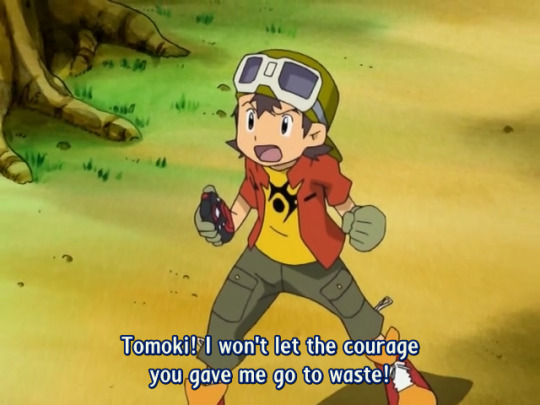
(On request by @digitalgate02.)
When you think about it, Frontier can be framed as a story of outcasts or misfits having to accept the idea of “changing themselves” in order to become better people, both literally in the sense of embracing physical transformation, and metaphorically in the sense of making attempts to do better. Implicitly, it speaks a lot as to how quickly these kids accept the idea of turning into something else -- perhaps implying as to how ostracized they’ve felt that such a thing instantly sounds appealing -- but it also adds some interesting layers to the concept of the Beast Spirit and how the difficulty of “controlling it” ties into each character’s personal story.
I think a lot of it has to do with the idea that these kids did have inclinations of being selfish or shallow at the beginning -- while they were full of potential to become heroes, they definitely started off as unlikely misfits at the beginning. In that respect, you can see the Beast Spirits arc as a sort of lesson that great power must be used wisely and responsibility...
Believe it or not, our biggest clue to all of this comes from episode 16, Izumi’s episode. It’s not directly stated in words, and the abstract summary of “determination” is passed off as a joke, but looking at the context clues around the episode indicates that’s actually not far off.
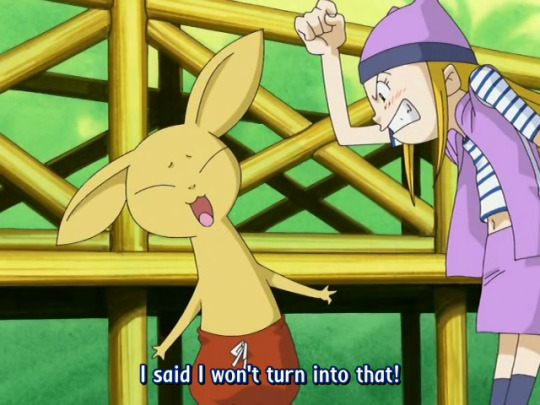
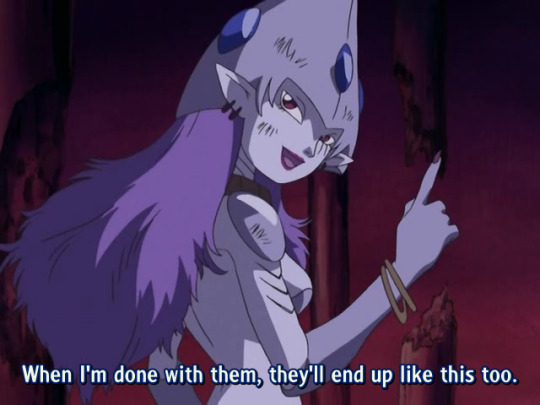
The thing is that Calmaramon is depicted as having the hardest time with her Beast Spirit compared to practically about anyone else in the group, and one of the recurring themes about it is that it’s partially because her personality is downright terrible. If you look at the context clues behind the prior episode (15), you’ll notice that while her looks are briefly brought up as an issue there and in this episode, the part that’s really freaking everyone out (and is making everyone worried Izumi will turn out to be the same) is that they actually saw it have an impact on her personality, where she was clearly conscious and able to talk but also indiscriminately destroying everything and enjoying it. At least in the case of Kouji, Takuya, and Junpei, they can be forgiven because they all did their best to keep it under control after the initial fallout, but Ranamon changing into Calmaramon had also involved her becoming someone actively reveling in senseless destruction. When everyone worries that Izumi might turn out like that, they don’t even bring up looks at all, and they all recoil when she does start showing signs of being destructive anyway.
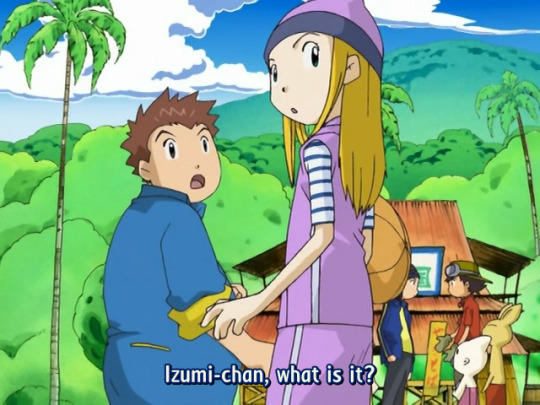
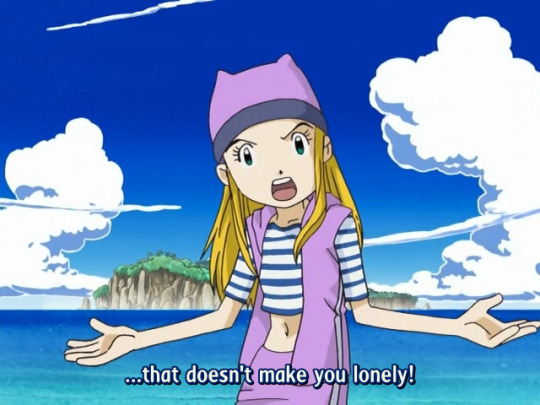
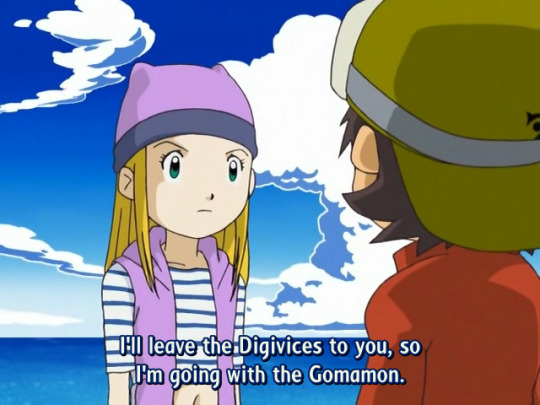
The thing is, the entire rest of the episode puts a massive spotlight on Izumi’s actions of standing up for the Gomamon and empathizing with their loneliness (which, given the contexts added about Izumi’s background and backstory in episodes 8 and 26, are most likely her feeling that the concept of “being isolated from others no matter how much you want to reach them” hit way too hard for her) to the point she puts her foot down to override the boys’ prior plan of chasing the Toucanmon and their Digivices. She actually faces quite a bit of protest from the boys on this issue, and even admits she’s not sure if her own plan will work, but focuses on the idea of doing her best to undo the whirlpool with her abilities -- that is to say, using her power to protect and help others.
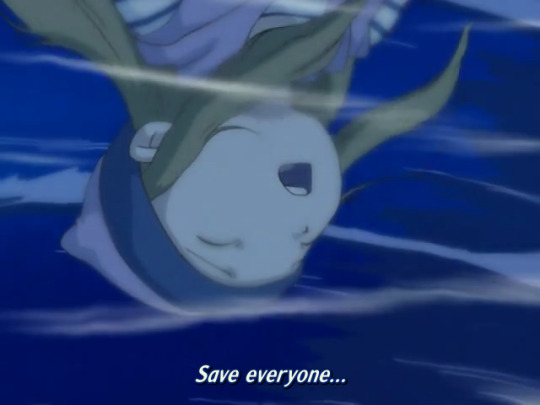
This sentiment of “I have to protect everyone” drives Izumi’s actions for the rest of the episode, to the point it’s the only thought consuming her head right before she finds and claims her Beast Spirit. So to make it clear, at the time she claimed it, the thought of “protecting others” was desperately, single-mindedly consuming her head...
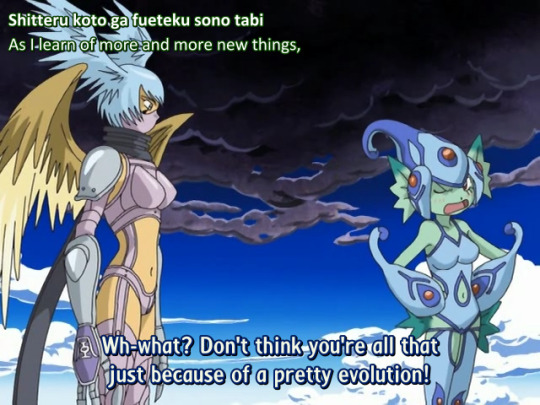

...and the contrast is immediately apparent when Shutumon emerges, and the only thing Ranamon cares about is looks.
In other words, the reason the Beast Spirit wasn’t working out for Ranamon/Calmaramon is that she only wanted the Beast Spirit’s power for the sake of pride, vanity, and dominating others, and because of that, she had difficulty controlling it because it resonated with those feelings -- after all, although she wanted to “control” it to the extent of not carrying her all over the place, she was perfectly fine with the part about causing wanton destruction. Izumi, on the other hand, is clearly holding herself back even after her first evolution to Shutumon -- trying to keep a calm head -- and, after all, her entire motivation had been driven by “helping and protecting others” for the whole episode, so she doesn’t want to let this fail on her now, and she keeps that calm head all the way throughout the rest of it.
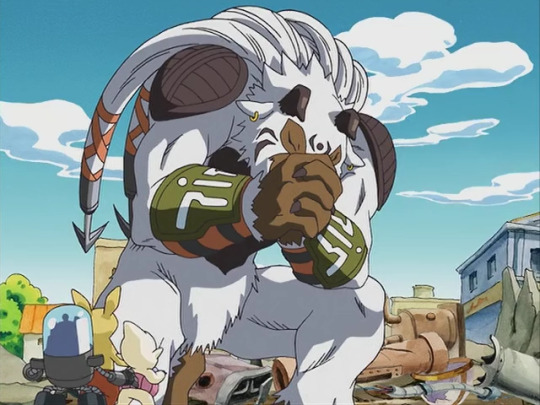
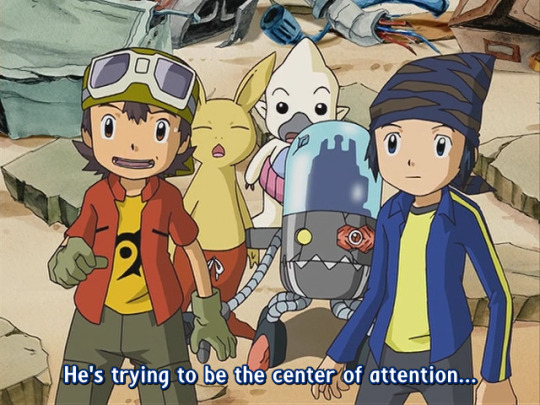
When we get to the next episode (17), you’ll also notice that one of the first things Blizzarmon (Tomoki) does is actively attempt to restrain himself. If you look back at what Tomoki’s character arc is about, he’d spent the better part of his past being bullied by others and tossed around, so “overpowering the weak” is the last thing Tomoki ever wants to do (especially given the events of this episode, as well). So, having witnessed the potential consequences of the Beast Spirit with the other boys, it stands to reason that Tomoki would want to avoid “hurting others” so much that restraining this would be a strong priority for him. While it’s commented that it does take his personality out of control a bit, the worst it ever gets is that he seems to be overly elated and cheerful about his defeats, but that’s also in line with Tomoki constantly having been pushed down so much during his life that you can imagine he’s enjoying the opportunity to finally be strong and have the spotlight.
But because he hates the concept of bullying and pushing others down so much, it stands to reason that he wouldn’t really have as much of a problem with that.
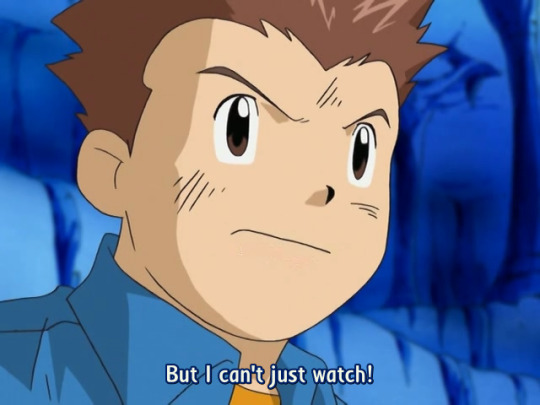
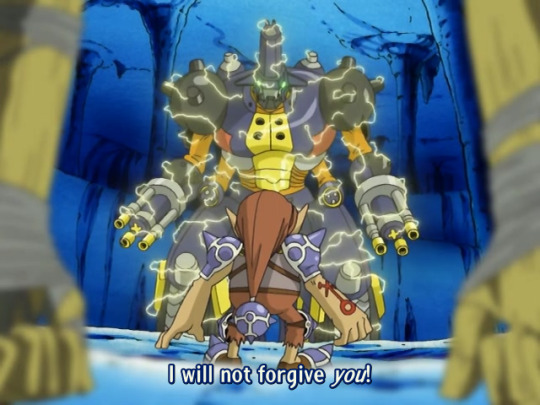
So when you look back at the prior episodes with the Beast Spirits with this context, you can see it applying there as well. In episode 14, Junpei was spending the better part of the first half of the episode livid at what was happening to his friends -- absolutely pissed at Grottomon for taking Izumi's spirit (and, despite Izumi's doubts, it's pretty apparent he actually does care about it beyond just having a crush on her), and then upset at the idea of being a sitting duck while Agnimon and Wolfmon are getting tossed around. While Junpei initially has trouble keeping the Spirit under control, the exact moment he gets a grip on himself is the moment he reaffirms his determination to fight for the sake of his friends.
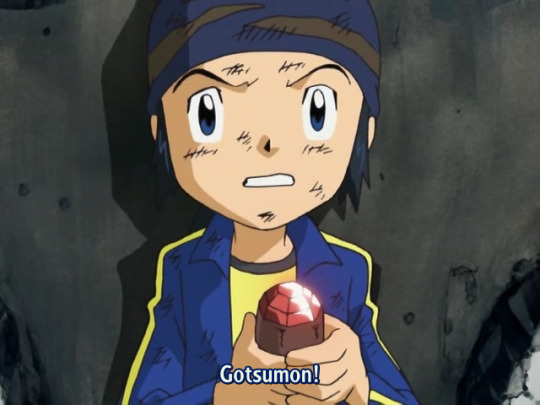
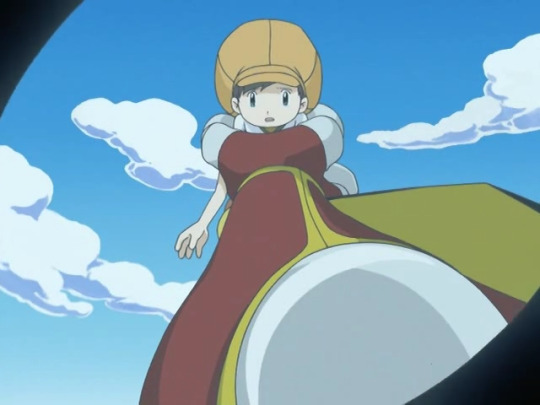
Looking back at the other two episodes about rampaging Beast Spirits in episodes 10 and 12, you can also see why the concept applies there as well. It’s interesting how the “worst” rampage shown among the main protagonist Beast Spirits was not the first one obtained (Garmmon) but the second one (Vritramon), and if you look at the circumstances surrounding them, it doesn’t seem to mean as much about Takuya having any particular stronger tendency towards condescending violence as much as the sheer circumstances that went on behind them:
Kouji obtained his Beast Spirit under the circumstances of already knowing that he needed to protect Gotsumon with that power (and, moreover, having spent the end of the prior episode and the duration of the beginning of this one mulling on Ophanimon’s warning that he’d need to “grow” before he could obtain it). Therefore, “using this power for the desire to protect others” was a huge thought in his head from the very beginning, even though -- presumably partially because this was a first time for everyone -- it threw him off just enough for him to end up exhausting himself.
Takuya obtained his without warning and without proper understanding of what he was dealing with, having had it practically forced on him after Shamamon-as-Vritramon’s defeat, and so, with no context of purpose and no real depth of what he was about to get into, he ended up on a complete destructive rampage. He was snapped out successfully by the need to not hurt someone (Tomoki), and spent the rest of the episode agonizing and mulling over the risks and meaning of having such power before he eventually evolved into Vritramon without too much issue the second time.
So the point is made clear: the “destructive” and “uncontrollable” impulses associated with the Beast Spirits will be sent out of control if the user doesn’t have a strong desire to use it with proper purpose. For Ranamon/Calmaramon, she had the worst time with it because she was the single most obsessed out of the Legendary Warriors to use it to stroke her own ego and vanity, whereas at least the other three Cherubimon-allied ones (besides Duskmon -- see below) were at least capable of using it towards a greater goal, and the remaining five went through the proper outlets of thinking about how this power should be used and how it shouldn’t be used lightly.
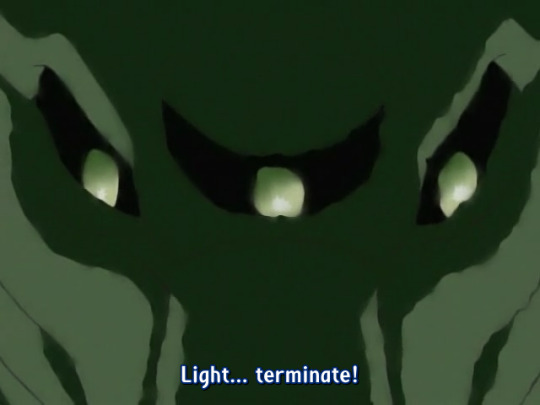
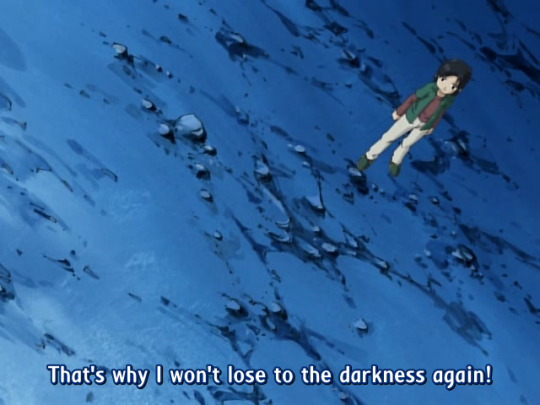
While the issue of the Beast Spirits being inherently difficult to control isn’t as prominent as we go later into the series, we do actually see shades of it when we get to the tale of Kouichi/Duskmon/Velgrmon, because while part of it can be chalked up to the power of darkness being consuming, Kouichi, during his first transformation to Velgrmon in episode 30, is only able to talk barely coherently and is really just venting his rage and anger out, presumably because his entire state of mind is locked into all of that, making the rampage even worse. (Also keeping in mind the theme of embracing the idea of changing yourself, you can also think of this in terms of how Kouichi is getting so consumed by his own emotions of anger that he’s become almost completely unrecognizable from his original self.)
Once we get his first “proper” evolution in episode 33, however, Kouichi is abundantly aware of what he’s done and has all of the proper determination to never let such a thing happen again -- so it’s not surprising that his evolution to KaiserLeomon happens with relatively little incident.
185 notes
·
View notes
Text
Thinking.
c!Wilbur wanted to be alone and isolated, but couldn't stand being lonely and separated from others.
Throughout his entire life, as well as during his death, c!Wilbur had a very strong tendency to socially isolate himself from others, to build walls around himself and push away those he cared about, and those who cared about him, both in a misguided attempt to protect himself and others. During his presidency, he himself admit to being very distant, and distancing himself from everyone else. He would only appear somewhat rarely, and usually it was for an important event, an introduction, or a political matter. The rest of the time, whenever he wasn't in front of a podium, he would hide away, expressing his emotional struggles and stress in private, where he wouldn't have to show vulnerability and reveal he wasn't okay.
In Pogtopia, he isolated himself even further, lashing out at others due to mental illness, pushing others away out of a lack of trust, and refusing to let anyone in on what he was going through. He stopped seeing, trusting, and often interacting with a lot of people he once trusted or saw as friends, purposefully secluding himself from everyone else. He fell deeper into his spiral, pushing those away that cared about him because he felt as if he couldn't trust them, couldn't trust anyone, terrified they would leave him and betray him as he had already been betrayed before. So he started to trust only himself, separating himself from others both emotionally and physically. Wilbur became trapped in a viscous pattern of fearing that people would betray him and leave him alone, and then pushing them away and isolating himself to avoid being hurt, and therefore ending up alone, with others having left him. Wilbur was also going through a lot, mentally, in Pogtopia, and part of his distancing from others was most likely to do with his strong desire not to have to be vulnerable and truly reveal what he was struggling with, as it was easier for him to just isolate himself and separate himself from others emotionally.
As his self-loathing and self-hatred deepened, so did his tendency to push others away, this time, for what he believed to be their own benefit. We've all heard the quote from c!Tommy, "He wanted to be treated poorly, so he treated everyone else poorly." Wilbur lashed out, purposefully drove others away, purposefully dug himself deeper into a pit of social isolation that ended with him physically taking himself out of the equation, in a misguided attempt to make the lives of others better, as his self-loathing caused him to believe that his presence in the lives of others was only detrimental and bad for them. Not only did he believe wholeheartedly that everyone hated him, he wanted everyone to hate him, wanted to leave the lives of everyone that he cared about because he cared about them, and his mental illnesses forced him to believe that he was nothing but a problem to the world that needed to be erased and isolated from the world. And in the end, he did the thing he knew could distance himself the furthest from everyone, he caused his own death.
c!Wilbur, for many years, fully believed that he should stay in Limbo. He believed, in his own words, he was "never good for that server." His self-loathing caused him to see his return as something that could seriously negatively affect the server. This is probably one of the largest examples of Wilbur isolating himself from others, and wanting to remain isolated. He believed he should remain in a situation where he wouldn't be able to affect anyone, and would be far away from others, even if he was alone. But we know, as viewers, that this isolation was detrimental to himself. Because c!Wilbur is a character that, deep down, despite his tendency to push others away, desperately wants to have company, to be with people. A lot of his fears and paranoia stemmed from him having a fear of being abandoned, betrayed, or left. A lot of his mental issues in Pogtopia stemmed from the belief that everyone was abandoning him and that nobody was truly on his side. Wilbur is terrified of being alone, of being lonely, without any real company, physically and emotionally. That's why I believe he so harshly projected onto Tommy in Limbo, grouping Tommy in with his self-loathing beliefs and including Tommy in his idea that neither of them were good for the server. Wilbur doesn't truly think that of Tommy, he has no reason to, but he's terrified of being alone in his harmful, self-deprecating beliefs. He's scared to be alone in his mental agony and suffering, and wants somebody else that he thinks is in a similar situation as him, even if Tommy definitely wasn't. It was incredibly harmful to say these things to Tommy, and nothing changes that, but that's what I believe was Wilbur's reasoning for doing so.
Wilbur described Limbo in a very distasteful manner, even going as far as saying it was the "worst time of his life." He hated Limbo, hated the crippling isolation, the agonizing loneliness. But, for so long, he felt like he had to stay there. He purposefully caused his own death in an attempt to both end his suffering, and separate himself from others since he mistakenly believed others would be better without him. He clung to the belief that he should stay in Limbo, stay in that place that was so agonizingly, painfully lonely for him, because he believed that his social isolation from others was best for everyone else. But at the same time, he hated it. He hated being lonely, being alone. And even now, we see that Wilbur is terrified of being alone again, so he clings onto Tommy, desperately trying to do anything, even using underhanded methods of persuasion, to get Tommy to want to stay with him and not leave him. He doesn't want to be lonely, and he never has, he hates it and is terrified of it. Yet, simultaneously, throughout so much of his life, he forced himself into isolation, pushing others away for what he believed to be both their emotional sake and his own. It's truly sad, and really shows some of the desperation, fear and well, human nature, of his character, as well as how his own mental illness-effected behaviors and thought processes really caused him to plunge deeper into a pit that would end up hurting him further and causing him more harm.
c!Wilbur wanted to be alone and isolated, but couldn't stand being lonely and separated from others.
#dream smp#dsmp#wilbur soot#c!wilbur soot#dsmp analysis#alivebur#tw mental illness#tw suicide#tw suicidal thoughts#tw self loathing#tw death#tw isolation#tw paranoia mention#/rp#im sad about c!wilbur again he's just so well-written#get this man some therapy
85 notes
·
View notes
Text
The double loss of a childhood - a not-so-brief analysis through Gon and Kite
WARNING: MAJOR CHIMERA ANT ARC SPOILERS //
.
.
First of all, this is kinda messy because I was writing and power went off </3. I wouldn’t even call it a meta, more of a psychological analysis.
It's so complex the way Togashi works through symbolisms. Gon and Killua had to let go of their childhood and childish behaviors. Had to make challenging choices. While two of the few grown ups who cared about them and gave proper attention to their relationship, are the perfect imagery of children: new Kite and Bisky.
These two are the greatest and overall positive influences within Gon and Killua lives in terms of adult Hunters, always looking out for the boys. Both of them are experienced, opposing the appearance of a child.
The irony is that, while Bisky and post-CAA Kite look like children (Kite is a child now, to be honest), Gon and Killua are, actually, real children facing painful and forced coming of age, enduring conflicts that even adults can fail to cope with properly - and this has been acknowledged by Knov and Shoot, also two experienced Hunters that got mesmerized by how those two kids could still fight, despite everything they saw and been through.
Anyways, Gon and Killua got their emotional development and their lack of experience put under extreme conditions, forcing them to break their dynamic without proper thinking, basically facing the war, the complexity of morals and relationships like adults.
That said, I’ll won’t be deeply working some points that I’m assuming you are all familiar with, like Gon’s reaction because Kite has been the fuel of his search for approval and being valued, or like how difficult it is for Gon not to handle things alone.
First of all, Kite is indeed Gon’s fuel for his journey. For the first time, someone cared to tell him the truth about Ging, and made him feel a little bit important. Noticed. Someone stayed by his side, for a short moment, and gave him a reason.
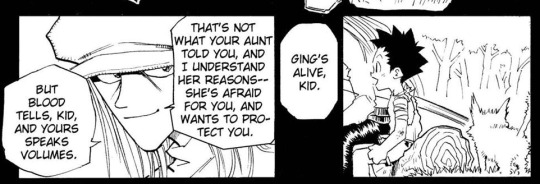
And if you take into account that he died two times before Gon’s eyes, it makes everything more shocking for the kid.
“Huh, what do you mean?”
Pitou has killed the physical adult Kite, but the rebirth itself “killed” the father figure imagery that Gon saw in Kite. Resembling now a girl of similar age as Gon's, Kite can not be kept as a replacement for the mentor and father Gon didn't have. And this is a heavy loss, because it took Gon’s goal away from him.

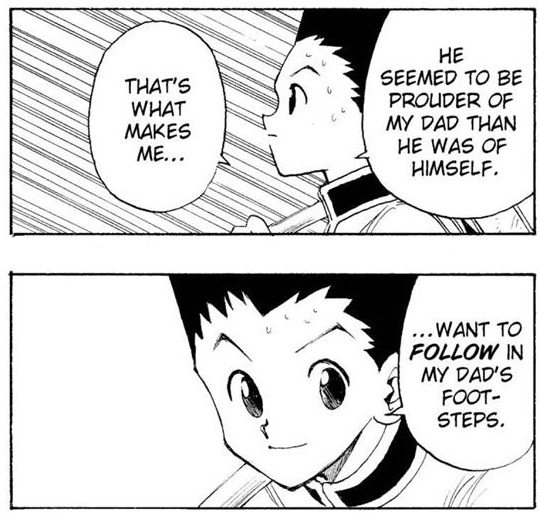
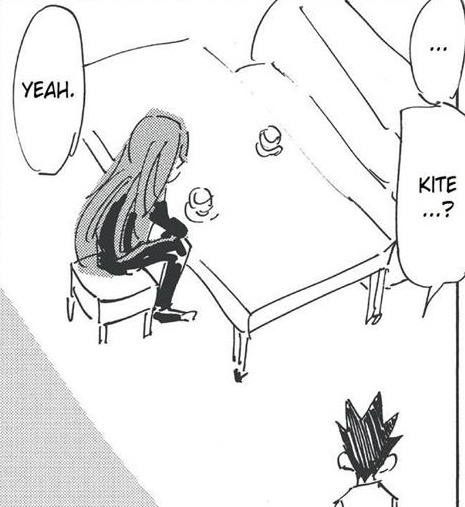
It's also a very smart and symbolic way to end this desperate journey around the urge of becoming deserving of proud, especially from Kite, the one who gave his life a purpose. Because Gon has stated, back in chapter 7, that “Kite seemed to be prouder of him (Ging) than he was of himself”, so he wants to walk the same steps as his biological father to make someone proud of him the same way. He can't project his goals around others anymore - and like the Koala Man said, the heart must be fed, or you’ll end up doing the same things again and never getting satisfied with the outcome. What you seek must be found in yourself.

But what Kite sees, in this chapter called Repentance (337) is that Gon is probably not ready for the amount of reflection waiting for him. Kite then sees no good in weighting his shoulders any more. The moment where he asks Gon “sorry about what?” is important, because it’s where Kite and the readers get to understand that Gon needs a break before realizing it.

Kite, then, avoid this subject. Gon is not ready.
Instead of throwing the truth about what was the real issue here, Kite first gives Gon craved the most: he praises him for being able to defeat a stronger enemy that Kite himself could not.

The boy’s reaction, though, it’s not what we would’ve expect from Gon.
Gon shows no trace of excitement over the fact he has accomplished his first goal - he was able to impress Kite. But, why is this so important? Because this is a breaking point for his journey. Gon doesn’t feel like he cares about this anymore. If Kite is not the same, he shouldn’t be either. If being approved doesn’t mean the same, meeting Ging is pointless. His past self has died, alongside with Kite - figuratively and directly speaking.

The troubled boy acknowledges that "if it wasn't for Killua (name separated from the rest ‘cause he has his special spot) and everybody else, I wouldn't be here". This means a lot for Gon’s development and grief, because the moments where he feels he’s messed up or must redeem himself, he doesn’t mind getting hurt or overcoming fear in order to handle “his mess” all alone. If he proves himself and protect the ones he loves, he will do it. But he needed help, and this is something he doesn’t feel proud of.

That’s when Kite shifts the engine once more.
It’s useless to make Gon feel better addressing old desires. Like Kite himself, Gon also got a second chance. They are both letting go from their past.
With a sweet tone, Kite breaks the cycle of the strong father figure: it's the same for him. Kite, the major inspiration for Gon, says that he didn't make it alone, too - and that doesn't make him less strong. He can’t be this parental figure anymore, maybe he didn’t even know he was. The only thing he knows, is that there are different types of strength. They are not weak for having friends and needing help.
With this, Kite closes the curtains. A strong and admirable Hunter, that wasn’t any less powerful for needing help. Gon shouldn’t be ashamed of this kind of strength: the power of making others wanting to be with him. Something that could not coexist with following Ging steps - Gon must belong to himself and separate him from others’ expectations.
That’s the final act of the mentor Kite, where he dies as a projection. Funny is, this moment with Kite holds some good parallels with the next chapter, where Killua and Gon part ways. Though I don’t think they’ve meant 100% the same, there are some hints that Killua also kept the soil fertile for Gon - but this is yet to be addressed in a future post.


Back to the story, Kite’s not a parent, not even an grown man anymore. He pushes Gon forward to meet Ging, because that’s the one thing that will end this cycle, definitively. No one to look up to, to pursue admiration from, and getting blind from fear of being weak and left behind. He must face change. This desire to be approved even if it costs his life has reached an end. This part of his journey must be accomplished - and left behind.

Gon can now center his journey around developing his self-esteem, thoughts on himself after knowing his own worth. He has a lot to make up for with Killua, but he had been forgiven. The soil is fertile once again, the seed of self forgiveness can grow. He can come up with a goal that centers around love with proper growth and responsibility, without others having to make up for self-esteem he lacks. He’s a traumatized child, that probably never put much thought on how lonely and scared he felt before he acted, and his coping mechanisms mimics his lack of experience.
He can now be free of the thought that, if he sacrifices this "undeserving being" he is on his mind, people will choose not to leave. Because giving up on his life wasn’t the right way to let them feel safe around him. They’ve left anyway. Everyone thanked him and look like they’re not mad, and he has found his father, but why things still look... unsatisfying? What meaning Ging even holds for him, still?
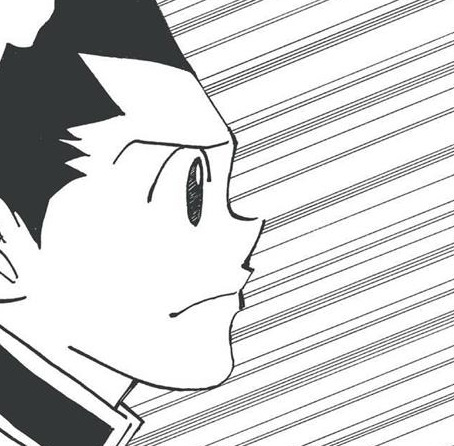
Losing his first goal is like losing his past self, and his childhood. Gon can’t walk backwards, though he comes back to Whale Island, things are not the same anymore, just like him. Losing the imagery and the person Kite is a twist of cycle, losing the urge of meeting Ging is cutting ties with this past self and this mad search for his own value in wrong sources, and now he has to understand what he wants and can do the way he is.

He must figure it out on his own, how he can grow from this and how to fix things before he finds a new goal. He has found something more important than the thing he was once hunting. Or better saying, someone. Someone that should’ve, yes, shared his feelings instead of creating distance - but he knows this certain someone left him with a smile because he cared. Killua will never overbear him, but can’t be the one to analyze everything for him anymore.
Gon has been forced to slow down and think, because in loneliness, there’s no one to impress. There, is where his identity will be found.

When you care about yourself, you learn how to take care of others. True, changing hurts. Losing childhood hurts. Losing strong beliefs and having to reconstruct yourself is a process. Bereaving children mostly don’t get proper attention because their anger, isolation and dismissive attitudes are often scolded than embraced, because they’re expected to endure loss like adults.
The dead don’t come back to life. Last minute, saved by the most important person in his life. But changing is the only inevitable thing while living. Kite was that important, but he must go away from the responsibility Gon has, unconsciously, put him through. Now, his journey consists of a blank page, waiting to be written once again with this new self, in order to learn how to fix his relationship with the one he loves the most. Killua wasn’t planned to exist in Gon’s life. They didn’t expect to run into each other, but as soon as they did, they’ve slowly changed their goals. Things seem off right now, but there is no room for replacements or masks.
Gon might have not noticed, but his goal wasn’t the same already. Meeting Ging brings not the same feeling anymore, especially because Killua was the first thing running Gon’s mind when thinking about this meeting, a major indicative that Killua was, already, his top priority over his father - and maybe he never put a second thought on that, the way Gon is single-minded.
But now there is room for a lot of thinking, and there’s something we must remember, an optimistic hint that I’m saving its analysis for the separation meta:
“Gon is not the type to break a promise twice”, Killua has once said.

144 notes
·
View notes
Text
After Each Midnight Begins A New Day
[3zun fixit extra #1 - Set immediately after the end of part 5, concurrent with the first half of part 6. The product of Meng Yao’s afternoon drinking with Wei Wuxian while Nielan were having quite the afternoon together for Lan Xichen’s first time.]
[Masterpost]
“San-ge!”
Wei Wuxian’s startled greeting makes him raise an eyebrow but the man doesn’t even have the sense to look abashed.
“Sorry ha, I just thought you and da-ge would be busy ah...reminding Zewu-Jun why he doesn’t have anything to worry about in your marriage.” As far as attempts at baiting him go, it’s relatively weak. He doesn’t even twitch.
“We need to talk.”
A theatrical gasp, then, “San-ge, are you here to break up with me? Are you here to break your poor Xian-didi’s heart?”
Meng Yao sighs but it’s not like Wei Wuxian’s antics are unfamiliar territory. In fact, most of the time he quite likes coming to spend time with his brother in law (no one else in Cloud Recesses wants to bitch, and sometimes Meng Yao just wants to bitch). This time he’s mostly just not in the mood to do anything at all except crawl into his husbands’ laps and stay there for a very very long time, but seeing as they’re otherwise occupied and his walk has so far provided none of the answers he’s looking for, here he is.
“Er-ge was telling us some things, but there are important points he seemed to feel were...unnecessary. Or perhaps too upsetting to share.”
The teasing look slides off of Wei Wuxian’s face instantly only to be replaced with the shrewdly calculating look that many have come to fear.
“Does he know you’re here asking me?”
“No.”
“Does da-ge?”
“Tell me what he won’t say, Wei Wuxian. I will not force Xichen to breathe a single word he doesn’t want to, but I have no qualms about forcing you.”
“Mhm, there’s the stone-cold bitch I know. Alright, come on. Let’s do this quickly before Lan Zhan gets home.”
Meng Yao steps delicately over the threshold of the Jingshi to find that Wei Wuxian has turned the space into his workshop for the day, papers and experiments in varying levels of completion strewn seemingly haphazardly around the room (although he knows from past experience that there is typically a system of organization to it, in the loosest definition of the phrase). He stays out of the way as Wei Wuxian begins picking up enough of it for the two of them to sit at the table, muttering to himself about what could go where for the moment as he ‘tidies’.
Once there’s enough of a space at the table for him, Meng Yao sits amongst the rest of the mess Wei Wuxian hadn’t bothered to touch in his cleaning efforts. He mentally arranges his list of questions as he waits for Wei Wuxian to plop down across from him, his inelegant sprawl as ubiquitous as the matching jars of wine he has set down on the table between them.
“Trust me, you’re going to want some of that after I’m done. Go ahead then, tell me what you want to know.”
“What does it mean that er-ge was in seclusion for five years?”
“Ah..hm. I suppose the Lans really don’t do seclusion anymore, do they? Unintended side effect, that’s interesting. I’ll have to ask Qingheng-Jun if that was on purpose.”
“Wei Wuxian.”
“You’re just going to have to deal with the way my mind works today, san-ge. It’s been an interesting morning, I’m tired.”
“Alright, then I suppose..don’t bother starting with telling me what Qingheng-Jun has to do with it, I’m sure I’ll find that part out. Just tell me what it meant for Xichen.”
There’s a long pause as Wei Wuxian seems to give his request proper consideration, his gaze distant in the way Meng Yao is quickly coming to catalogue as, ‘thinking of an extremely painful past’. He’s already beginning to resent that look, no matter whose face it appears on.
“For Zewu-Jun’s seclusion, he allowed no visitors for a year. He spent his time alone in the Hanshi, and we only knew he was still alive in there because all of his meals that got delivered were eaten, and sometimes we could hear him playing his xiao. I don’t know what he did in all that time, that’s something you’re going to have to ask him. After that first year, he started allowing Uncle Qiren, Lan Zhan, and our son to come see him. Not...Not A-Xiao..we have..had...a different son..our A-Yuan.”
Meng Yao can think of nothing to say so he watches in silence as Wei Wuxian’s eyes suddenly go glassy and he reaches forward to open up one of the bottles of wine to take a long sip. “A-Yuan is a story for another day,” he finally says when he’s downed what was probably half of the jar, seeming slightly more composed as he sets it down again. “Just know that he is a very very kind and gentle young man, and his visits to Zewu-Jun were good for both of them, I think. “I started visiting him three years into his seclusion, and..he looked exactly the same as he had when he began, like...like no time at all had passed and he was still hurting just as much. I didn’t know what to do except keep visiting him. Lan Zhan was the Chief Cultivator and the acting Sect leader, and he refused to trouble Zewu-Jun with any of the needs of the Sect. Looking back it might have been good for him to have something to help him feel productive, but..I don’t believe he was willing to trust himself and his own judgements anymore. I’m not sure he would have agreed.”
Meng Yao doesn’t particularly want to think too closely about why it was himself that Lan Xichen hadn’t been able to trust anymore, but he suspects he’ll need to learn the reason if he wants to truly understand the situation at hand.
“What is the purpose of such isolation?” he asks as he tucks that discomfort away to be examined later in private.
“Penance. Grieving. I suppose you could say that there are as many reasons as there are people who choose to do it, but..I’ve only known it as punishment. Whether it’s assigned or self-inflicted, it’s a way to withdraw from worldly concerns to meditate on one’s sins and fix the behavior that caused the sin in the first place.”
“And Zewu-Jun’s seclusion...it somehow has to do with me and da-ge?”
Meng Yao goes still under Wei Wuxian’s calculating gaze, feeling strangely like one of his experiments. He supposes, wryly, that he is. The man he is now is partially the result of Wei Wuxian’s experimental array with Lan Wangji, and he’s not quite sure how he feels about that.
“This is a very ugly story, Meng Yao. Are you sure you want to hear it?”
There is no hesitation in his voice despite the dread curling in his stomach as he says, quietly, “Yes.”
----
Wei Wuxian was right about the wine.
Meng Yao clutches his fingers around the cool jar and tries to fight the bile rising in the back of his throat. He will not show such weakness to Wei Wuxian, nor does he particularly wish to see his lunch a second time.
Wei Wuxian is surprisingly knowledgeable about some of the things that Meng Yao is certain had been secrets for a very long time before Wei Wuxian and Lan Wangji had begun investigating him. Even with everything Wei Wuxian has been able to tell him of his actions - and the list is horribly extensive - Meng Yao instinctively knows that it must only scratch the surface of what had to have gone on behind the scenes to orchestrate such things, and that’s what’s making him nauseous.
Because he can picture it so easily. He has no trouble connecting the dots, drawing the paths he must have taken to arrive at such extremes. He knows precisely how he would get from one event to another with the tools at hand. The steps he would take now, if forced to choose, to reach the outcomes that Wei Wuxian remembers. He is still that man, or he at least has the capacity to be. He is far from blind to how easily he could have slipped.
“You understand now why we had to watch you so closely for a while.”
“Yes.”
“Good. Then you also understand why we stopped?”
Meng Yao lifts his gaze to Wei Wuxian to find the man finishing off his wine with a sigh, pouting down at the empty jar once he realizes there’s none left. Normally Meng Yao would hand him the rest of his own, but today he simply shakes his head no in answer to his question and takes another sip of his wine.
“We stopped because you’re not that man. You never have been, not in this life. Oh I’m not saying you’re not capable of such things, because people are capable of a great deal of unsavory things when circumstances force them to be. But now? Right now, the man that you are...I wouldn’t go so far as to say that there’s no reason for others to fear you, I wouldn’t dare, but now it’s for the same reasons we should all be feared every once in a while. We’re all a bit too protective of the people closest to us, hm?”
Meng Yao considers this as he sips again at his wine. Wei Wuxian is, for once, apparently content to let him sit and think in silence rather than intent on pulling him out of the shell he retreats into to think.
He is, in so many ways, still the man that Wei Wuxian, Lan Wangji, and now Lan Xichen remember. He’s aware enough to admit that about himself, and not all of those ways are what would likely be considered positive. But as he ruminates on the narrative Wei Wuxian had spun for him, he can see through it all the behaviors of a desperate man clawing and dragging his way to the top, aching for a semblance of the kind of wonder he had seen the cultivating world with when he had been a child.
He is still that boy who had sat on the steps of a brothel in Yunping and felt how much the world looked down on the woman who loved him with everything she had to give, and on him for being an extension of her. He still holds, deep in his heart, a longing for the world to be like the better one for him that he had imagined when he had been young.
The difference, from what he can tell, is that this time he has been spared the violence that had originally turned those desires into a dagger clutched in his fist. His love is still sharp and biting, he would still kill without a second thought if he felt his small piece of the world, the people that he cares for, were in any danger at all. And if it becomes necessary he knows he would still, in this life, choose to be underhanded and manipulative at the cost of others to protect himself in the process of systematically eliminating any threats.
It’s why he and Nie Huaisang make such a good team leading the Nie Sect, even though he typically does his part by writing letters from the comfort of Nie Mingjue’s lap in the Hanshi. Their plots and scheming all happen - for him, at least - from the safety and comfort of Cloud Recesses, and when he becomes too embroiled in the politics of it all either Nie Mingjue or Lan Xichen (or both) are usually quick to kiss him and drag him back out of it before he can become too sharp at the edges, too cold.
And that’s truly the difference, isn’t it? This time he has husbands who know him, including the ugly, jealous, scheming bits of him - and they love him. He has Jin Zixuan, who had welcomed him as a brotherly figure with relatively minimal coaxing in their youth, and the pair of them had in turn collected Qin Su and Mo Xuanyu to join the awkward sibling enclave of Jinlintai when they had learned of their existences. Out of a tumultuous and painful childhood he has managed to gather a family around himself that is perhaps not what he would have ever thought to ask for, but he has learned to appreciate it all the same. He has a home and a life that he can carve into and make his own.
He’s happy.
“Er-ge blames himself for what I did, doesn’t he?” he finally asks, though he already knows the answer. The question earns him a snort from his companion as he lounges further back on the floor - far too relaxed in Meng Yao’s opinion but the only rebuke he offers is a pointed sip of his wine.
“Zewu-Jun wouldn’t be Zewu-Jun if he didn’t take the weight of the world onto those broad shoulders, would he? It’s a Lan thing, I think. Qingheng-Jun went into seclusion to atone for Madam Lan’s transgressions when they were young. It took a lot of work to get him to come back out, and to this day you know he still doesn’t leave the mountain. I suspect he never will. Then Lan Zhan, the great Hanguang-Jun, was whipped mercilessly and forced into seclusion for three years as punishment for the things that I had done, though admittedly I don’t believe the seclusion would have been by his choice if he’d been allowed to make it, and if I had not died. And finally our beloved Zewu-Jun secluded himself for the things that you had done in pursuit of power, and I think to finally grieve properly for Nie Mingjue as well. They can’t help it, Lan men just want to run themselves into the ground trying to be responsible for everyone in the world.”
“I see. And what makes them think that the people who want to protect them would want to see them hole themselves away in silence and solitude for years on end?”
“That’s where I get lost too, yeah. I’m glad they don’t really seem to do it anymore, I really need to ask Qingheng-Jun about that. But it’s never really made much sense to me either.”
“You said earlier this morning that you’re not sure if A-Sang knows about all of this?”
That makes Wei Wuxian sit up again to fix him with an excited look and Meng Yao has the good sense to brace himself.
“Correct. But now we have you in the know! You should ask him. Feel him out.”
“Why have you not done it yet yourself? I am not your errand boy.”
“It never really seemed important, I suppose. I had my Lan Zhan, and as long as things seemed to be going better than last time we figured it was best to do as little meddling as possible. Really all we did was nudge things away from the directions we knew would end in tragedy and then we tried to let things take care of themselves. As long as da-ge lived and the truth about the Nie sabers was brought to light before Baxia could whip up his temper too much and drive him to qi-deviation, we trusted that things would work out alright. And they did! But now I’m curious as to how much of that was natural and how much of it might be Huaisang scheming.”
“That still doesn’t make me your errand boy.”
“Aiyah...fine,” Wei Wuxian whines, slouching back down onto the floor with a put-upon pout that Meng Yao doesn’t buy for a moment. “I guess I’ll talk to him myself.”
Meng Yao glances out at the path leading to the Jingshi and he’s a bit startled to see how late in the afternoon it is, the sun already kissing the mountainside in preparation to set in a couple hours’ time. “There is more that I want to know,” he sighs, “But I believe that is enough information for today. I should be returning to the Hanshi.”
“Why do you want to know how it was before?” Wei Wuxian asks. His nonchalant posture and tone would do wonders to mask the sharp curiosity in his gaze were he talking to anyone else. “What are you getting out of it?”
“Is wanting to understand my husband not reason enough?”
“Sure, if you were the type of man to only ever have one motivation at a time, which you’re definitely not. But tell me this, then. What if he never remembers this life? What if all he ever remembers is what we came from..?”
The hard glint in Meng Yao’s eyes even as his lips stretch into an answering smile is dangerous, a silent warning for Wei Wuxian to back off from such a personal topic - they’ve touched on a few too many for his comfort in such a small span of time. At least Wei Wuxian, as the sensible man that he pretends not to be, raises his hands in surrender with a wickedly sharp grin of his own.
“Point made, San-ge, easy. I just have to know you won’t hurt him, that’s all. He’s been through more than anyone deserves.”
The reassurance comes to his lips without thought. He finds that he can’t help but mean it with every fiber of his being when he replies, “He has never been safer.”
#3zun#wangxian#Meng Yao#Jin Guangyao#Wei Wuxian#So if you're reading it along with the rest of it this extra belongs alongside part 6#Meng Yao leaves the other two in the garden at the end of part 5 (when LXC feels his hands slip off his shoulders)#and he takes a walk to the Jingshi to ask WWX just what the fuck is going on#Because he guesses (correctly) that LXC will never tell him the extent of his misdeeds#y'all the main story is fighting me so hard rn T_T#I'm trying to get it written I know exactly where I want it to go and it's just not. Getting. There#But until I can wrestle with this unnecessarily complicated world I've created have some extras! I'll have some more coming soon
43 notes
·
View notes
Note
I think it's interesting how many people were wanting Jester to leave Artagan and go with the Moonweaver (who is awesome btw). I can't properly convey how relieved I am that didn't happen and that their already strong bond was made stronger and they both grew from it. Because that is how good relationships work and people are capable of changing for the better. Finding new faith worked for Fjord, but I don't believe it would have worked for Jester the same way. What they have can't be replaced.
If Artagan was forcibly taken from Jester it would have been traumatizing for Jester.
What the Mighty Nein, and perhaps a portion of the fandom, don’t understand is that Jester is a depressed lonely person who hides it. She puts on a mask of always happy and fine, it’s ok. She’s not ok and they don’t see it. Jester is also afraid of being alone, which plays into her fear of being disliked and abandoned.
Whether or not anyone else likes Artagan, Jester LOVES him and she has some serious attachment issues so just ripping him away from her would be super harmful.
There’s a scene in C2E19 where the party sees a shack and wants to investigate it. Jester suggests turning Frumpkin into a bird to go check it out since it’s like a mile away. Caleb does not like the idea, but then playfully says for you Fjord I will do it. Jester responds by being dramatic and pouting about him shooting her down but being willing to do it for Fjord.
LAURA: Can Frumpkin be a bird?
LIAM: (reluctantly) Yeah.
TALIESIN: For a bit.
TRAVIS: I want to check out the shack.
LIAM: All right. For you, Fjord, I will make Frumpkin a bird.
LAURA: Not for me, though. Caleb hates me.
SAM: We could just walk over there. It's a hassle to turn him into a bird.
TRAVIS: Yeah. Keep your cat.
LIAM: You are more sensitive than I would have imagined.
LAURA: I want people to like me.
Caleb is extremely observant and although this is a light, playful scene, says something that cuts really close. “You are more sensitive than I would have imagined.” She’s being over the top and dramatic, he criticizes her, and since what she was joking about what is actually some real insecurity she kind of deflates, her voice gets real small and she says “I want people to like me.”
It’s a blink and you’ll miss it moment made harder to catch by the fact everyone is talking at once and Laura is eating pizza (role-playing with your mouth full - this is not to shame her for eating, she is entitled to that pizza, but it might make it harder to pick up on the moment). However, I think this touches upon something important.
Jester is in fact extremely insecure about being liked, and you see this with her relationship with the Traveler. Worrying that he might not like her now that she has other friends at first, and constantly needing reassurance that she’s the most important.
There’s a brilliant thread on reddit that sums up Jester’s character as follows:
“She's a people-pleaser because she's afraid to lose people. She grew up with the only 'low resource' being people - caring, loving, laughing people. She had her mother, who definitely loves her, but that was it. Most children have scores of people, and other children! to play with. Jester didn't.
And she's afraid to lose that, at any cost. Even realizing she was manipulated, keeping Artagen is more important than standing up for herself or showing her disappointment, because she can't lose him.
Onto - Artagen. What we know:
He's openly admitted to being manipulative and selfish
More importantly: he's openly admitted to never wanting to be bored and never wanting to 'get into emotions'
This REALLY matters. Why?
Because Jester is afraid of losing everyone so she can't be what those people don't want.
Jester can't be upset in front of Artagen because he might get bored with all of her emotions and leave.
It's crazy important for her to be his favorite because, as she is helping him leave all of his followers (her biggest fear) he keeps saying he won't leave her.”
Jester has pretty serious abandonment issues. Children need the attention and support of a caregiver. RedditTotalWar made a great point on that reddit thread: “A significant withdrawal of attention is often enough to cause a child to develop abandonment issues. Children don't have the capacity to realize that some things aren't about them since they are the centers of their own universe.” So the fact Jester’s mother, who clearly loves her and is a good person, did not always have time for her and required Jester to keep her existence secret is damaging.
Note, this is not to suggest that Marrion is a bad person or was intentionally abusive. You don’t have to be a monster to hurt a child. Disney example: In Tangled, Mother Gothel isolated Rapunzel and was an abuser who just wanted to use her. In Frozen, Anna’s Mother and Father isolated Anna out of a desire to do what they thought was best for their other daughter Elsa and to protect Anna from what they saw as the threat posed by Elsa’s magic. Anna’s parents were not intentionally abusive and loved their children, but Anna was still neglected and isolated and harmed by their actions.
To Jester, the message she got growing up was ‘Momma loves me, but she’s busy and I can’t get in the way and no one can know I exist’ which could easily be taken as ‘Momma loves me, but I’m not the most important thing to her’ or even ‘Momma loves me, but my existence makes her life harder, so maybe I’m not completely lovable since I’m a problem’.
And while you may think, if she was that worried why would she act out and play pranks and cause trouble, the fact is that children who are insecure about being loved may self-sabotage with caregivers. You see a high rate of disruption in foster children right before adoption because the child starts exhibiting behaviors. Perhaps faced with the fear of, maybe my parental won’t love me if I cause trouble, it feels safer just deliberately causing trouble because then at least you’re the one in control rather than walking on eggshells terrified that messing up could mean abandonment.
The fact that Jester’s prank on Lord Sharp resulted in her having to leave the only home she’s ever known and never come back under threat of death and that her Mother could not (or in her mind, would not?) protect her may have made her abandonment issues a lot worse.
Jester is terrified of being left alone, of being abandoned. Taking away the one person who has been a constant in her life and who she has felt safe with all at once would not be good. As Laura said on her playlist “he’s always been the one person she could show her insecurities to” and losing that stable, trusted person would hurt.
I don’t think her relationship with Artagan is entirely healthy (it’s not healthy for a child to grow up with only one other friend and her attachment to him extreme and also he’s a selfish, manipulative Archfey - I don’t think Artagan thinks this relationship is entirely healthy). However, I do not think it would have been better for her to have him ripped away like that. Especially given the fact that the whole Moonweaver thing was her idea and she would likely blame herself for what happened.
How devastating would that be for someone with Jester’s level of insecurity?
The Mighty Nein, and again a portion of the fandom, may have preferred it if Jester broke up with Artagan and moved on or found a new god. Fjord’s relationship with Uk’otoa (Uk’atoa) was toxic and abusive, so the Mighty Nein are very wary of that sort of relationship. Fjord if projecting and thinks that any relationship with a powerful being that isn’t a god is dangerous.
The truth is Jester’s relationship with Artagan isn’t really like one of cleric and god. It’s more like a personal relationship where he happens to give her divine powers.
LAURA: I take a bite of my caramel apple, and I go walking down.
MATT: You hear a crunch sound and your handshakes for a second and you look down and a mysterious secondary bite was taken out of the apple.
LAURA: (gasp) I lick the spot.
(groaning)
SAM: You're making out with your god? Gross.
MATT: They have a special relationship.
A special relationship indeed, Matt. It’s intimate, she talks to him about her crushes and asks him for advice on boys then casually confesses love to him.
LAURA: You're not jealous, are you?
MATT: "No."
LAURA: You'll always be my number one love.
MATT: "I know.”
Fjord is an orphan who was looking for parental figures. Vandren was a mentor and father figure, and it was through Vandren that Fjord gained his connection to Uk’otoa. The Wild Mother felt Motherly to Fjord and in Talks Travis said that when Matt first described the feeling his thoughts were on like have I found my Mother somehow. To Fjord religion is a divine parent, an authority figure who provides guidance and direction, and in the case of the Wild Mother love and support for him.
Jester has never seen the Traveler as a ��dad figure’. He’s just her best friend and based on her behavior towards him and jealousy towards his other followers, and the number of love songs on Laura’s playlist, I’m pretty convinced that Jester is IN LOVE with him.
(I don’t know if that feeling is required. Given they grew up together with him in the form of another child and the fact Artagan is actually ancient, I think he sees her more like a little sister. This might be why he was so confused when she grabbed his face and leaned in like she was about to kiss him despite the fact that like she’s flat out told him that he’s her number one love and requires constant reassurance that she’s his favorite and acts like a schoolgirl with a very obvious crush)
And again, all of this may not be healthy or ideal for Jester. She might get hurt. However, I think in order to grow the relationship has to run it’s course no matter what happens. Artagan not only acted completely selflessly by kicking her off of him rather than face the possibility that she’d have to choose between him and or friends or be banished with him but like - he apologized to her.
An actual, real, non-manipulative apology. He admitted he was manipulative and he’s sorry and when she tries to play it off as it’s fine, he says he doesn’t want to defend himself. He’s sorry.
That’s growth.
#artagan#jester lavorre#Critical role spoilers#critical role#critical role meta#meta#essays#Anonymous
109 notes
·
View notes
Text
Turning 21 - an unwanted landmark
It happened an hour and 20 minutes ago, as the clock hit midnight CEST and the date changed so seamlessly to the 12th, without any hesitation, uneventfully and in complete silence, just as expected. The day I've been negatively anticipating for the better half of the past one year has come, and it caught me sitting at my computer alone in the living room, drinking hot tea on a summer night in a sweater and doing my silly little tasks that I call "work" (because despite my best efforts, middle of the night is still the only time of the day I can function as intended).
I remember ever since I was a child I always used to start mentally preparing myself for my birthday from New Year's Day. Even my mother used to say, "now that it's 2010, you're already 10 to me", even though August was still nowhere to be seen. But that felt good at the time. The beginning of a new year and my birthday approaching meant hope and progress, as the only thing I wanted as a child and as a teen was to grow up and not have to be a child anymore. I didn't like going to school, I didn't like being told to do things, I didn't like not being taken seriously, as I'm sure no one does. But by "didn't like", I mean it caused me severe emotional distress, the stuff that happened to me every single day without my control. It's hard to tell now in retrospect what caused what, but I have memories of developing my two most prominent and persistent mental disorders at around 6 years old (social anxiety and a BFRB) which have isolated me and often subjected me to cooler kids poking fun at me, shortly followed by starting school in the middle of my parent's divorce and moving houses. One of our last dinners in my father's comforting family home at the dinner table, I remember being visibly sad and my mum asking me what was wrong. My slightly belated answer ("everything") did not quite get the desired reception, as she and my little brother went on to have a little giggle over making assumptions about what that must include ("I'm sure she's sad over dinosaurs going extinct too..."). And, from then on, it's pretty much been downhill. I didn't like being home and I didn't like being at school (or at any of the million extracurricular activities my mum had picked out for me falsely thinking they could stop me from hurting myself and not just accelerate it). The ever-present social anxiety, bottled up frustration, high academic expectations and confusion about the nature of my very own self-destructive behaviours did not make for an enjoyable time in any of my 12 years at school. So, obviously, all I could do was anticipate the end. The end of being vulnerable to the very systems that were meant to nurture me and protect me.
I think that was my way of thinking all the way until I turned 19. Two years ago. At 19, I had graduated high school, I was about to start university studying something I was interested in, I had a semi-stable student job I liked and I was ready to move in with my boyfriend (a former classmate), separate from our parents. I had an artistic goal that I was ready to work for in my free time, and living away from home I was finally going to get the capacity to do so as well. And then when all of this happened and my thoughts became occupied with the new kind of responsibilities that came with "adulting", I started getting this overwhelming feeling of "what now?". A couple months have passed in the blink of an eye, it was November and I wasn't happy. I was making virtually no progress on my creative goals, my flat was a smelly mess, I didn't see my friends and I wasn't making new ones, and I found university to be draining and incompatible with my brain. I wasn't enjoying anything. I thought, "is this how I'm going to have to spend another 3 years?".
And then a miracle happened. I had to give a presentation at uni with a couple of other girls, and one of them suggested a book to do it based on. Reading my part of the book to prepare for the presentation has unlocked something in me - it was a book about the way people manage to feel like hostages due to their own decisions and thoughts. First it hurt to read because I had to face the truth: I wasn't really a hostage of expectations, university or responsibilities, I was a hostage of myself and my own attitude. I even wrote a song about this (my ultimate way of being honest with myself), and that's when I've felt ready to start working on myself in order to take back control over my life. And hell, I have done it. In a couple of weeks, I was feeling the best I've ever felt and I went into exam season thinking I was capable of the impossible at this point. Who knew I had it in me? I had gotten through a couple of exams and assignments and I was thinking soon I was going to start improving in other areas of my life as well. I was going to make art, see my friends again, go out, have fun, maybe learn to cook and be a better girlfriend too. Not a lot of that has happened. Came the end of exams and the second half of January and I was already exhausted. My job was at a halt and uni wasn't back on until mid February, so I spent a few shallow weeks at home just thinking "why am I doing this again?". It was difficult, suddenly having too much space for negative thoughts and rumination.
But it was only the start of the pandemic when my race with time has really begun. Which is ironic, because when the restrictions were first announced in my country, I really saw a lot of opportunity in them to grow for myself (and I mean this is in the least "this deadly virus is a blessing in disguise" way possible). University moving online and social gatherings being nothing short of illegal all of a sudden felt more than convenient for my social (but very luckily not health) anxiety ridden brain, and I had imagined this was going to be the most prosperous phase in my life, in terms of moving forward with my goals.
Ever since I was little, I had dreamed of becoming a musical artist. No one ever encouraged me - maybe for a good reason - and I tried to keep quiet about it as well. I was so ashamed of desiring something that was so "unlike me" according to everyone who knew me. I never had a good voice and everyone perceived me as shy, on top of being seen as more of a "STEM girl" (until I went to high school for maths and ended up not understanding any of it anymore). I'd been writing lyrics into my phone since 14 and attempting to turn them into actual songs on my laptop since 17. At 18, I even took a beginner's course in Ableton. Still, I just never felt like anything I wrote was of any worth or that I had a single ounce of talent in any part of the process. But I kept on dreaming and pushing because I thought "if I don't try, how will I know?". My work ethic was awful too, I was an inconsistent writer and an even more inconsistent producer. I never got anything finished because I got lost in the details and gave up due to my perfectionism. Plus, and this is what I perceived to be the biggest problem at the time, I could only record music at home, and my family were home all the time. Moving out, I thought I was going to prosper, then I didn't prosper for a bit, told myself it was okay because uni was making me depressed, then I continued to not prosper, told myself it was okay because I had to rest up after exams. And then it's like the universe said "Stop. You're just making excuses. Stay home and produce those songs now because there will NOT be another opportunity like this".
I put so much pressure on myself then to get stuff done. It felt like my time - all my adolescence I was looking at teenage popstars rising to fame and each year they were just getting younger and all I did was compare myself to them and worry. Worry that I was running late, that no one was going to ever care about me because I am late, but growing up I excused it every time. I was home with my family and stressed because of school all the time, duh, how could I have made good art? But right there, at the beginning of "quarantining", it was just me and my willpower. No school, no job, no impromptu social plans. And who knew how long it was going to last? Some people said only four weeks, some others said months, some the rest of the year. All I knew was I was 19, still young and practically a teenager, and I had to act. And I did. I made two of the worst songs you've heard in your life and I put them both out in the summer under my own name. Like proper released them on streaming services and all. Looking back now, holy hell, how desperate was I, posting it on my social media that people I actually knew followed? With my fear of being ridiculed? I was setting myself up for an emotional disaster. Shock horror: my songs didn't blow up (although I have had a few friends say lovely things about them, at least to me). By the time of scheduling the second one for release (mid July) I was already feeling burnt out. Yes, there was another exam season in the meantime, and the unexpectedness of the elongated pandemic has definitely been a factor as well, but generally I was just so let down by the overall underwhelming experience. I made such bad decisions - why my own full name? Why did I have to let people know and thereby handicap myself? Of course I wasn't going to promote my songs now or even speak of them positively because I feared coming off ridiculous. So I just let the whole thing pass without a sound and made myself sad. By last August, I was back to "what now?".
Needless to say, there were no festivals last summer. Festivals used to be my ultimate summer happy place and I always celebrated my birthday at a specific one (the biggest one in my city to be exact) starting with the 15th. Concerts and festivals were somehow simultaneously an adventurous escape from all my worries and the root of a lot of my confidence issues and anxiety. I dreamed of being on stage and presenting my art to the world, pouring my heart out to even just one person who will listen, the same way that I listen to my favourite artists and what they have to say. Some nights were emotional, some nights were energising, some nights were spent worrying about the people who surrounded me and some nights were just pure jealousy and feeling far away from my goals - you never knew what you were going to get at a gig. I think that overall most gigs were bittersweet experiences for me, but that's how I liked them to be. The whole point was just to feel something. But there were no festivals last year. There were concerts, though, put on by local bands, but lord do I wish there hadn't been any. I went to two of those last summer - one I went to alone and walked away feeling like shit, another I went to with my friends and felt extremely guilty and anxious about the virus after. This second one happened to be two days before my 20th birthday. I spent my birthday worried to death that I got the virus (even though numbers were extremely low at the time in my country and going to small gigs was perfectly legal and deemed not dangerous) and that I was going to infect my elderly relatives who I was going to meet with later. That didn't happen, but I haven't been to a single show since then, and it's been a year. So that's how my first non-festival birthday worked out.
Turning 20 didn't feel good and my birthday aligned with the onset of a bunch of new problems as well as old ones accelerated. I began to think deeply about everything. What was the point of anything I was doing? Was any of it going to get me anywhere? Was any of it causing me joy, even? I didn't know what to do about my musical efforts - should I keep trying to put out songs or admit defeat? I still had that creative drive in me and I worried so much about my role in the world - "I'm not a good friend, not a good girlfriend and not a good daughter, and I certainly will never become a good psychologist directly helping people with their problems. I need to give something to the world - I need to find a purpose". I didn't do stuff because I was anxious, and then I was anxious because I didn't do stuff. But I think at that point I also realised I didn't only want to succeed and produce. I also wanted to live. Having fun was missing from my life too. I rarely saw or talked to friends and my relationship wasn't going well either. Every day I tortured myself looking at other people live their lives on social media and thinking to myself I wanted what they had. I wanted to be someone. I wanted to create, to connect and to matter, but all of these things have only ever caused me anxiety in my life and I didn't know where to go from there.
With the virus getting worse again and the start of another online semester, there was one silver lining to locking myself in again though. During the pandemic, I have been playing a lot of video games, possibly even more than before. They weren't only a nice way to numb my brain and relax - no, the opposite, they were actively giving me a temporary sense of direction and progress with each gaming session. I have always loved The Sims for this reason, I had spent so many years building and perfecting my little worlds to my liking and practicing full control over my characters' lives, but this time I began to feel like it was something bigger. I discovered the Sims side of the internet, something I had not really done before, and the amount of content, help, info and Sims-related entertainment has blown me away. Whole new levels of playing have been unlocked for me and I began to dive deeper than ever. I wanted to be part of the community, so in the autumn I started streaming the game on Twitch and this time I knew better than to tell anyone I already knew about it. That didn't quite turn out as I expected, and my streamer phase was cut short in January by someone I knew from high school accidentally finding my stream. Before that, I would only get moderately anxious before streams, not worried much about what viewers were going to think of me (if they find me annoying they'll just leave and I'll never have to hear from them again), but then that unexpected turn of events ruined everything in my head. All my confidence I had built up was suddenly gone. I never streamed again after that. It wasn't really for me anyway, I told myself.
Instead, insistent on further pursuing the only thing that was giving me joy at the time, I started my YouTube channel initially uploading Sims tutorials, because I thought I had useful stuff to show people that has a greater chance of making someone happy than just watching me try to put together a sentence for 5 minutes straight while my Sims struggle to get in the shower by themselves. And much to my surprise, it was gaining decent traction, although I put a lot of it down to luck even today. But either way, it's been growing more or less consistently ever since, and beginning of the summer I stopped to think "could I not just be doing this for a living now?". "Could this be my new creative ambition?". As much as I would have liked to say yes based on my progress and how I managed to earn the same amount I would have earned in a month at my part-time retail job (we're talking Eastern European sums kids!), it wasn't that simple. Thoughts around this have of course been puzzling me for months now. I like to think of myself as a natural talker, just because I am anxious I am NOT quiet or shy. I can even make small talk very well, it's just that because I'm mortified by the possibility of an awkward silence I tend to avoid situations where it might be required. And I talk to myself all the time. So on paper, talking to a camera should not be an issue. And yet every time I record a video I feel my soul being sucked out of my body because I need to make sure I say every sentence correctly and that ends up in draining 4 hour recording sessions. Editing videos, on the other hand, is a rewarding process, a kind of flow-experience I have not really known before, though extremely long and usually detrimental to my sleep schedule (which is far from being rosy by default). Maybe I just put too much effort into everything, but it really makes you question - is it worth it? Can I really be doing this on the long run without destroying myself? And will I ever get used to the social interactions that come with it?
It's weird, suddenly getting recognition for something, people giving me positive feedback on the daily. This certainly happened more suddenly than I thought it would and I don't think I was prepared. Naturally, people taking the effort to leave me nice comments and messages makes me want to reply, appreciate their kindness and return the favour but the trinity of little demons inside me - social anxiety, impostor syndrome and a chronically low self-esteem - makes this a difficult task to complete. To combat the overwhelming weight of responsibility that comes with making sure I appreciate everyone who appreciates me enough, as well as to shut out the fear that what I have now can be taken away from me any second, I have built up a mental wall between me and my relative success. This wasn't a conscious choice, it's just the way my brain has started dealing with this new situation. I do not allow myself to internalise the rewards of what I work so hard for and that contributes to why, when I look back on 2021 so far, all I see is depression despite having "gotten what I wanted". My YouTube channel has been the only thing bringing hope and the only thing I've got going for me and yet I am incapable of embracing it.
The past one year has been enlightening. It has enlightened me that there must be something deeply wrong with me because I have not been able to enjoy life even at times I had all the reasons to. The times I am capable of letting go and feeling happy for short periods come exactly based on that - short periods. I'm drifting into states of bliss only when I know the situation is temporary and doesn't come with commitment and responsibility. Some of these moments of calmness come to me while walking to the store by myself after dark, getting invested in my video games, meeting up with my friends for an evening every once in a while and writing a therapeutic song just for myself using the simplest chords on the piano. The feeling usually doesn't last and disappears at the first attempt to get back to any kind of organised schedule (that attempt on most days is the simple act of trying to force myself to go to bed). Isn't that ironic? I wanted purpose. I wanted to get it together. And yet... every day is a struggle. I know now, I am the problem. Whether it's a chemical imbalance or another anomaly in my brain or my own fault somehow, it's not my circumstances, it's me. I wanted to be free and to make my life my own, and now I just can't. Every day I worry about running out of time, rapidly approaching death and not being able to say that I have lived. This is why turning 21 fills me with so much panic. I am no longer a child and I'll never be again, although I wouldn't even like to be. I just can't help thinking that I wasted so many opportunities to enjoy myself and to push for my goals. But it's gone now and there's no point regretting how I used to think about life back then. If I look back on my life so far I see a lot of stuff that happened that made half of my brain temporarily happy, but the other half was always filled with anxiety, anticipation to get out or dissatisfaction. It was just never fully right and I keep hoping that there will come a time when it will feel fully right. Before turning 19, I thought independence was going to give me that. Now at 21, I'm not quite sure there's anything that's going to give me that if I don't also start to work through every single one of my issues (although part of me still likes to cling onto the idea that once I'm done with my first and last degree, a lot of underlying stress and guilt will be taken off my shoulders and I'll see everything in a different light). So for a start, I just finally signed up for psychological counselling. I don't know if it will help but it's something and I've done it for myself. I need to do more for myself.
There is so much more I could talk about. Like the pandemic, how I've turned into a hermit, my relationship, struggling to be honest with myself and slowly losing touch with my all time number one passion because of it. I could talk about how I know that society has been deliberately making us (especially women) feel scared of aging and yet I still file it under personal issues, how I've been trying to fix my sleep schedule for a year and a half straight now, the guilt I feel from my family and friends all the time, my inability to concentrate and how I fall into despair concerning the future and present of humanity every time I read the news and people's opinions on social media. I could talk about how I want to cry every time I see a picture of somewhere beautiful in the world - a street in Japan, a lake in the Alps or the trees in the Mediterranean - because I feel a longing that is almost nostalgic for places I've never even visited. There is always so much to still be told to complete the story, but why do I want people I'll never fully know to understand me that well? I need to let go of compulsions like these.
Deep down I just hope that I'm not the only one terrified of growing old.
#21#happy birthday to me#long story long#welcome to my brain#aging#depression#anxiety#growing up#growing old#young adulthood
6 notes
·
View notes
Text
⍚ HaikWeek!! 2020 ⍚ Day 5 (Tobio Kageyama) Pawns
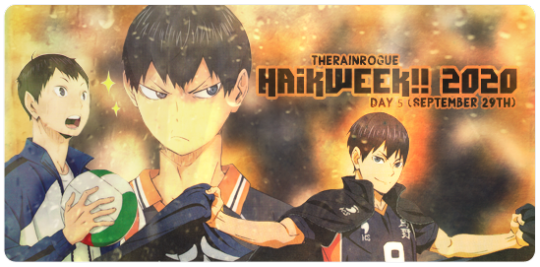
📑 Table of Contents | « Previous Day
Genre: Fluff, Friendship, School, Slice of Life
Word Count: 2,564
Pairing: Reader x Kageyama
World: Haikyuu!!
Prompt: Best Character Development & Patterns/Habits
Author’s Note: Here is the next entry for @haikyuuweek2020~ This fic is written from the perspective of the reader but it’s written as if they were speaking so instead of saying “you believed him” it would be “I believe him”. You’ll see the reason for this at the end of the fic ;)
━━━━━━༻⍚ 🏐 HaikWeek!! 2020 🏐 ⍚༺━━━━━━

I first met Kageyama-san in elementary school. He was quite an energetic child and got along well with the other kids. He was the cool kid that everyone wanted to play with and be friends with. The other children were always vying for his attention and he was happy to share it.
Even back then, he was quite sporty, always carrying around a volleyball and drinking a milk box. That was how the other kids tried to get into his good graces, they would bring him milk boxes. Perhaps that attributed to his current height. I am not too sure about this.
In elementary school, he was on a little league volleyball team called the Little Falcons. While they never played in official tournaments, they did well and Kageyama-san was always so happy whenever he was on the court. It was if there were no darkness in his world as soon as his feet stepped onto a volleyball court.
Back then, he was a bit of a class clown. He loved to make people laugh even if it was at the expense of himself. Because of this, he often found himself in trouble with Miko-sensei. His older sister would often scold him when she came to pick him up, but he would just smile and laugh it off as if it were no big deal to him.
His grades were not all that impressive, I remember. He had to get a tutor to make sure he did not fail and I believe this was because of his intense love for volleyball. It was all he wanted to do, what his heart most desired. I believe that is what first attracted me to him.
Even at a young age, he had so much drive. He knew exactly what he wanted in life and nothing would stop him, not even terrible grades.

When he entered junior high, he was excited to join the volleyball club at Kitagawa Daiichi. He wanted to be a setter and he was already quite skilled at this position. He was a natural on the court, as if it were meant just for him. It can be hard to express in words, but I will do my best.
When Kageyama-san stepped onto the court, it was if something magical was happening. His accuracy and precision were frighteningly on point and I recall overhearing the senpai talking about how he was a prodigy. This made sense to me as someone that had grown up watching his playing the sport. He most definitely was a prodigy, but he also put in the effort.
People believed that he was born with natural talent and that is how he got so far, but I find that hard to believe. I have seen the work he put in, tirelessly practicing every moment he could. Nothing else mattered to him.
Perhaps he heard these things said behind his back.
Perhaps the way Oikawa-senpai treated him affected him more than he was willing to let on.
Perhaps he truly did just lose his way.
I can not say for sure what caused his shift in demeanor, but I can say it started halfway through our second year at Kitagawa Daiichi. His demeanor started to shift, subtly at first, but by our third year, it became glaringly obvious that he had become a different person.
He was no longer that excitable kid that just wanted to play volleyball. He became determined to stay on the court even at the cost of his friends and teammates. The other students simply could not keep up with his accuracy and insane quick attack. Not for lack of trying, they tried very hard to keep up with him, but Kageyama-san was on another level entirely.
Eventually, they stopped trying. No one wanted to play with him because it was not fun for them. It was stressful and irritating. I would often hear the cruel things they said about him behind his back but I never felt like it was my place to speak up in his place. I regret this now, but dwelling on the past garners no results.
I worried that his new attitude would further isolate him from his peers, thus ruining any chance he once had of achieving his dreams, but I was just an observer. What was I meant to do? I did the only thing I knew I could – I kept my faith that Kageyama-san would once again find his way.
At this point in time, he was walking blindly through a long, dark tunnel, searching for any source of light to save himself. While it is my belief that the first speck of light came in the form of one boy from Yukigaoka junior high, I do not believe that this was enough to break through the darkness that had settled over him.

High school was another chance for Kageyama-san. I truly did believe that but I knew that he still had a long path laid out before him before he could dispel the inky blackness that had invaded his life.
The first thing he did was join the volleyball club. This gave me hope for several reasons – the first being the fact that the speck of light from Yukigaoka junior high was attending the same school and also planned to join the team. The second reason was because of my brother’s best friend, Daichi, who happened to be the captain.
Both of these people shined so brightly, rushed forward with such a fierce determination to achieve their own dreams and break through their own limits. Meeting these two men, along with the rest of Karasuno’s volleyball team, became the catalyst for Kageyama-san.
It took several months and he relapsed into his old habits on more than one occasion, but he has changed from that isolated king back in junior high and he is now a better person because of it. Though his grades remain poor, Kageyama-san gives his all to volleyball, to the Karasuno volleyball club.
He has regained the meaning of teamwork and has once again realized that volleyball is not a sport that can be played by one’s self. This makes me happy, because it would be a shame to see so much talent wasted.
I chose Kageyama-san for this project because I have watched him grow and change all of these years and, though he hit a rough patch in junior high, he has found the light at the end of the tunnel and broken out for all of the world to see.
He is not the lonely king anymore.
Kageyama-san is now a pawn, but that is not a bad thing for he is working together with the other pawns in order to take down those that stand in the way of their dreams. These pawns are protecting the king, who represents their dreams, and the queen, who represents the Karasuno volleyball club.

You looked up from the pages in your hand, looking out at the class as they stared at you with wide eyes. Even the teacher was surprised by the subject of your presentation, who sat at the back of the room looking like a deer in headlights, his face the shade of a tomato. No one knew what to say.
Amai-sensei cleared her throat, clapping her hands. “W-Well, thank you for sharing your project with us, Y/N-san. You were very thorough!”
“Thank you, sensei,” you murmured softly, bowing to her before returning to your seat. You could feel the other student’s eyes on you as you settled down, but you paid them no mind, stuffing your paper into your notebook before returning one of the earbuds into your ear, pressing play on your phone.
The class had been given an assignment exactly one week ago and it was fairly simple – choose someone that you thought had experienced major character development and explain this development. Most of the students chose fictional characters, people from history, or even family members, but you had chosen your classmate – Kageyama Tobio.
You had never spoken to this boy but you had known him since you were both kids, living in the same neighborhood. All throughout school, you managed to find yourself at the same schools and in the same classes with him, so you had witnessed his growth first hand.
When your brother, Aki, and his best friend, Daichi, found you in the kitchen one day working on said project, they tried to convince you to write about someone else. Not only were you putting personal information about the boy’s past on display for the whole class to see, they worried how others would view you.
More specifically, they worried about Kageyama’s reaction. He was known for his angry outbursts, after all, and since you had never interacted with him, they worried about your image. You weren’t the least bit bothered by the possible consequences, though. You thought Kageyama was an interesting boy and you felt proud of his accomplishments.
He had come so far and, even though he fell down along the way, he was able to climb back up and be a better person. In your opinion, it was an incredible story and you thought this could be a way to express your feelings to him. You put your heart and soul into the project and could only hope he realized that.
Your eyes slid over to him but he was slumped over in his seat, head lowered so that his bangs formed a shadow over his face. You could see his expression, but his body was tense. Had you really crossed a line?

When the final bell rang throughout the school, you added the second earbud, turning up the volume of your music before picking up your bag and exiting the classroom.
Because of how distracted you often got, a bad habit of yours that your brother tried to break, you had been forbidden from walking home alone so you always stayed behind after school, alternating between watching your brother play baseball and watching Daichi play volleyball. Today was Daichi’s day so you headed for the gymnasium.
You were just arriving when a large hand landed on your shoulder, tugging you backward. The earphone was ripped from your ear, coming to dangle down by your waist. Your eyes widened, snapping over to the person that had grabbed you. Kageyama stood there, huffing and puffing like an angry beaver, face twisted as if he needed to use the restroom.
Aki and Daichi always were telling you that you needed to pay more attention to your surroundings. Perhaps it was time to listen to them.
You shifted your weight, waiting for him to speak. His gaze had always been intense and piercing, you knew that after years of observing him, but it was on a whole nother level when it was directed right at you.
“Why the hell did you write your paper about me?” he demanded, trying to search your blank expression for any sign that might help answer his question.
You focused your gaze on a line of ants that were slowly making their way across the pavement. Eye contact had never been something you enjoyed or were good at maintaining. “I-Is it not obvious?”
“Of course not, that’s why I’m asking!”
“Oh,” you frowned, fingers tugging at the loose thread on your bag’s strap. You had been hoping your feelings would reach him through the assignment and you felt a bit upset that you had failed to properly express yourself. Feelings were hard, after all.
Kageyama felt his eye twitch. Oh – was that really all you had to say? Why were you so nonchalant? With the monotone expression you wore, it was impossible for him to get a read on what you were feeling or thinking.
It had always been that way ever since the two of you were kids. Back then he had been intimidated by your blank face. It didn’t help that the other kids claimed that you were a witch and would curse him if he upset you. Of course, being a kid at the time, he believed this whole-heartedly and some part of that stuck with him all of these years.
“I apologize if I have upset you, Kageyama-san. That was not my intention.” The words sounded sincere but he had trouble fully believing them when you spoke in such a deadpan voice. “If it will make you feel better, I will ask sensei to give me a failing grade. Good day.”
His eye twitched, mouth falling open as you gave him a soft bow before turning back around and continuing on your way. Shaking his head, he rushed forward, using his body to block you from going forward. “That’s not – I don’t – I mean – ugh!”
Your lips tugged downward at his obvious frustration, eyes turning down toward his shoes. “My brother often tells me that I have no sense when it comes to people… he warned me that you would be upset, but I chose not to listen. Please forgive me.”
“S-Stop apologizing,” he muttered, feeling his cheeks heating up for a reason he couldn’t quite determine. He tried to hide this behind his fist as he looked off to the side, not that you had your gaze on him to begin with. “Just tell me why you wrote that about me.”
“Because… I think you’re amazing, Kageyama-san.” It was subtle, but he picked up on how your voice lightened just the tiniest bit. “I really admire you and, in a way, I was trying to show you my admiration and support.”
“W-Why didn’t you just tell me then, idiot?” He put his hand over his heart, feeling it race beneath his palm. His body was starting to lose its composure and there was nothing he could do to stop it.
“Oh,” your eyes widened a fraction, finally lifting to meet his own. You looked confused, as if that thought hadn’t occurred to you.
He wanted to facepalm so badly, but he thought you were so cute the way you were looking at him as if he had just turned the light on in a dark room. Swallowing down his nerves, he forced himself to hold your gaze. “I… thank you. What you said… I really appreciate it.”
You tilted your head. “I thought you were mad?”
Kageyama quickly shook his head. “No! I was just… confused.”
“I see,” you shifted your weight, mulling over your next words. “Would it be possible… can we be friends, Kageyama-san?”
“Yeah,” he breathed out, feeling a new round of heat rushing to his cheeks. He only hoped you didn’t notice. “I’d like that, Y/N-san.”
Faint as it was, he noticed the soft tilt of your lips as you smiled, his eyes widening like saucers. You were already a really attractive person but when you smiled, it was a whole new level of attractiveness. He was positive his heart stopped at that moment and he clutched the pole beside him, his body shaking.
Your smile instantly dropped, hand coming to rest on his shoulder. “Are you feeling sick?”
“I-I’m fine.”
“Are you sure? Your face is awfully red.”
“I said I’m f-fine! I just… need a moment.”
“Okay,” you offered him a small nod before continuing toward the gym, unaware of his eyes following you, shimmering with warmth.
━━━━━━༻⍚ 🏐 HaikWeek!! 2020 🏐 ⍚༺━━━━━━
» Next Day
📜 Read more by checking out my masterlist 📜
#haikyuuweek2020#haikweek!! 2020#kageyama tobio#tobio kageyama#haikyuu#haikyuu!!#anime#writing#creative writing#writeblr#scenario#scenarios#anime scenarios#anime scenario#fanfiction#fanfic#fanfics#anime fanfic#anime fanfics#reader insert#reader-insert#reader#one shot#fluff#friendship#slice of life#school
11 notes
·
View notes
Text
Jaclyn Santos
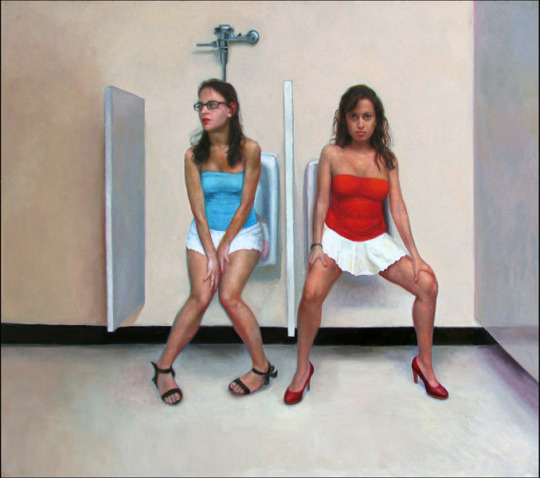
FP: We've spoken about the subject of the male gaze, and even part of the mission statement of FP is to question what it means when women artists control the power of their own objectification. There have been other artists who have paved the way, ie. Vanessa Beecroft, why do you think it is still considered controversial and shocking for a female artist to portray her sexuality as outwardly powerful and/or vulnerable?
JS: While many women artists have displayed their own sexuality in their artwork, every girl and woman still has to confront this topic individually and form her own convictions. It's something we continuously re-examine as we age and deal with new personal struggles. There are so many conflicting messages in society regarding a woman’s stance on her own sexuality and most women are still trying to figure it out for themselves. On one hand, society definitely rewards physical beauty yet, in many other ways, it can be an impediment. Increasingly, I think people turn to media figures as a barometer for their own morality. For the "Shock Challenge" I wanted to generate discussion about the way women are often criticized because of images they present of themselves – particularly the way certain female celebrities objectify themselves by posting sexy personal photos on social networking platforms such as Twitter. Often these photos are low-resolution and snapped from cell phones. I decided to photograph myself in this manner as a sort of contemporary “self-portraiture” and elevate the photos to fine art status by re-contextualizing them. I then displayed the images in the gallery and allowed the audience to physically alter the work in any way with sharpies, which draws attention to the way women are criticized online. I titled the piece, “Triple Self-Portrait in Bathroom,” which references Andy Warhol, an artist known for working with the idea of celebrity persona.
Another reason it may still be considered controversial is because of female competition, which occurs in part due to socially imposed myths of female worth. The scrutiny with which women can judge each other is incredible. Growing up, I wasn’t horrendously unattractive but I did go through an “awkward phase,” and for five years of my life other girls ridiculed me nearly every day. Now that I am older and have grown into my looks, I am condemned by some women because I keep up my appearance, when if I didn’t I would be put down for it. The world sets up a standard for beauty, then criticizes those who admit they struggle with it. I’m willing to honestly examine this contradiction through my artwork.
FP: You've also mentioned isolationism in your statement...a theme that seems to be prevalent in American culture today, particularly because of the internet, and our ability to be alone yet still remain virtually connected. Can you speak about how that relates to your work?
JS: I think the piece I did for the "Art That Moves You" challenge on WOA, "11x17", touches on the issue of isolationism in contemporary urban culture. It also examines voyeurism, a somewhat natural response to isolation. While most people do not spy on their neighbors' with binoculars, voyeurism has transcended to the internet in a more diluted version, where many of us use social networking platforms and blogs to comment on the lives of those we see on Television and other forms of Media. The pseudo-anonimity of the Internet offers protection while potentially causing further isolation. I think this has affected women in a very specific way. Oftentimes women display sexy images of themselves in an attempt to garner attention or praise, yet this often backfires into “unwarranted” criticism. Too often photos or explicit videos are released without consent.
FP: In regards to the nudity on the show...it really was a missed opportunity as you said for the production to discuss the current state of feminism as it pertains to the art world. Such a HUGE topic and yet (for the sake of time constraints? titillation of tv?) Bravo chose to edit down your provocative "shock value" piece to a hot girl defaulting to her own voyeuristic sexuality more than anything else. How did you feel about that? What could they have done to further the dialogue? What do you think would have happened if say one of the male artists had asked to photograph you naked or had photographed themselves naked...do you think more or less would have been made of that episode?
JS: So far my character has appeared very one-dimensional. The fact is, I am not a "bimbo" in any capacity. Instead of portraying my true personality, they jumped on every opportunity to dumb-down my character. I was very disturbed by the way my piece, “Triple Self-Portrait in Bathroom,” was depicted on Work of Art as well as the way my character and art making process were completely distorted. I don’t think this was done because of time constraints; rather, it was done to create a very simple story arch that any casual viewer could follow. This was problematic because it made me look like I default to nudity without any thought behind the concept of the work, which undermines my art process. I am not shy about my appearance as they suggest, but I did feel incredibly vulnerable being taped in the nude. There's a huge difference between presenting a photograph that I have carefully selected and composed, verses handing over raw footage that can be manipulated in any way whatsoever. I was very hesitant about doing this but I believed in the piece and the producers said they needed the footage only to display my process. Yet in the episode, the rest of my process was barely discussed, then it was falsely made to look as though I was not responsible for conceptualizing the final product.
The treatment of sensitive issues on set was different for the boys. A male contestant was not required to film himself ejaculating on a piece of art, which caused some tension on set.
FP: In The Art of Reflection: Women Artists' Self-Portraiture in the Twentieth Century, Marsha Meskimmon states: "If the task was to find oneself, then the crisis for the postmodern subject is that nowhere is home, everything shifts and changes. What is the reflection in the mirror that 'vanity' holds? She refuses now to be the 'site' of another's desire and reflects back to you the insubstantiality of your projections."1
Do you think it's possible for the physicality of an attractive female artist to ever be a separate entity from her work, particularly if she is the subject matter of her own work? Is vanity and the mirror important to an artist?
JS: To answer the question, if the womans' chosen subject matter deals with nudity or sexuality in the form of self-portraiture - i.e. Marina Abramovic, Cindy Sherman - no, I don't feel the artist's appearance could be a seperate entity. If the subject matter involves sexy images of other women or the imagery is more illustrative - i.e. Lisa Yuskavage, Hillary Harkness - I think it will be much less of an issue. I think it can only be a non-issue if the artist completely plays down her appearance or doesn't acknowledge it in her work. Yet this doesn't necessarily mean it won't be an issue. At a college critique, a guest artist was invited to our studios and the minute he saw me, before he ever saw my work, he blurted out, “you are the artist”? “You don’t look anything like an artist... YOU are as interesting as your work." This sort of thing happened so often that I made a decision to incorporate my appearance into my work.
FP: Another great quote from this same book: "One of the key issues in feminist theory has been that of women's voice in male language. To what extent is it possible to enunciate a truly different position when you are already within the structures which mark your difference?"2 Do you think the art world is still a predominantly masculine one or is it now equal...what has your experience been thus far?
JS: While certainly more doors are now open to female artists, there’s no denying the highest paid artists are all still men. There’s also no denying that the vast majority of Art collectors are men. I worked for Jeff Koons for two years and there were very few women who came in to purchase work. Granted, this may simply be because men still make more money than women and if women had more spending power, more of us would invest in contemporary art. I think it is a challenge to make work about women that can appeal to both a male and female audience on the same level. We respond to images of the female form rather differently, and it's hard to subvert the provocative aspect of a sexualized image.
FP: The high-low art status is interesting in your pieces --do you think anything can be elevated to art status by redepicting it?
JS: Yes, it can, if done in a particular way. Intent is important -- low art must be appropriated in an intelligent way. For instance, a high school student copying his incredible hulk comic book is entirely different than Jeff Koons appropriating the hulk into his personal iconography.
FP: You worked as a studio assistant to pop art icon Jeff Koons. Has he influenced your work? And who are your biggest influences?
JS: Before I ever worked for Jeff Koons, I loved his Made in Heaven series as well as his Luxury/Degradation series. Speaking of Made in Heaven, that’s a prime example of low-art being successfully elevated to high -art. Jeff Koons is brilliant and there are very few people who love art as much as he does. Working at his studio was an incredible learning experience. It was so interesting to see how he spoke with visitors about his work and I learned an incredible amount of technical skill while at his studio. Jeff talked "acceptance" quite often. We must accept who we are -- our individual and collective pasts -- our shortcomings, failures, weaknesses, and strengths. As artists, we must be honest with ourselves in order to make work that is personal yet transcends to a wider audience. So many artists have influenced my work, but to name a few: Damien Hirst, Marilyn Minter, Laurel Nakadate, Liz Cohen, Vanessa Beecroft
FP: Where do you see your work evolving now that you've participated in Bravo's Work of Art? Has the show inspired you in a new direction? What's on the horizon? Where can we see your work next?
JS: Participating in the reality show was an experience like no other. It really made me more aware of the internet as a portal for criticism and dialogue in fine art. It also opened my eyes to how incredibly critical and voyeuristic our culture is, and I think I would like to comment even further on these qualities in my new projects. The show also allowed me to branch out into other mediums when appropriate, something I think I may have been afraid to do before. Since the show wrapped up, I’ve been continuing my series of figurative paintings as well as a new series of explosions that respond to the war and oil spill.
Check my website, www.jaclynsantos.com for frequent updates of my new work.
2 notes
·
View notes
Note
2 10 n 11 :)
this is basically an essay im so sorry. watch how hard i can infodump (ill put this under a cut hopefully it works bc sometimes tumblr decimates the keep reading things if theyre in asks)
2. Who’s your favorite of the Bound? What do you think of the different ideologies they have? Which of the factions are you most aligned with?
WE ALREADY KNOW THE ANSWER I AM A PETER LOVER THROUGH AND THROUGH!!!!!! oh baby i love that morally questionable architect. pretty early on in getting into pathologic (it’s coming up on a year now...) i thought about peter stamatin too hard and now i’m here. but really i find him to be such a fascinating character!
the thing about pathologic that i love is how almost every character can be as complex as you want. pathologic does an excellent job of implying a lot of character traits while only exploring some in further detail, which in some games is frustrating but patho does it so well! it consistently hints at traits and lets you fill in the details yourself. peter’s character is extremely interesting to me... and maybe a little more relatable at times than i want to admit lol.
i think i’ll talk about both stamatins though! their dynamic hurts me a lot. i’ll start with andrey bc i’ve been thinking about him lately. although i’ll bounce back and forth between both stamatins.
i’ve said this before but i’ll say it again.... andrey’s role as a protector who inadvertently hurts the people he cares about really gets to me. he is not a shield but, in his own words, a battering ram. and the problem is that battering ram has a recoil.
i have to wonder how that mentality of his came about, anyways. the implication is that it’s always just been him and peter, so did he take on that role because there wasn’t anyone else to do it?
in his efforts to protect peter from... military, i believe, he kills four people. which leads to daniil getting mistaken for andrey, which leads to daniil getting shot. and almost dying. he protects peter but to a smothering extent, peter even says he’s been suffering for ten years bc of andrey which is a LOADED line. he protects on a physical level but he kinda fucks up on the emotional.
there’s a horrible irony in peter and eva being the people he cares about the most and both attempting suicide. with eva once she’s missing he immediately goes running off trying to look for her, and . ahh i can’t remember right off hand what exactly he thought happened. but ik he was probably expecting a fight. with peter he says that after that he’ll never let peter leave his side, at least “as far as his knife can fly”... it sounds cheesy but the one thing he can’t save anyone from is themself.
and god the way andrey bases his ENTIRE sense of self worth on peter fucking hurts. they’re not peter and andrey, the architects. they’re Peter And Andrey, The Architect. (thinking about “one architect, two brothers” here.) andrey thinks he’s larger than life and all but he’s constantly living in peter’s shadow. their theatre of death positions come to mind here, with peter standing up, looking down at andrey. but andrey is on his knees in front of peter, arms limp to his sides.... separated by a wooden beam...
peter’s side of this dynamic is fascinating too. his dependency on andrey is. ow. leaving all practical matters and decision making to him... there’s this resentment (That’s Fine I’ve Been Suffering For Ten Years Because Of Him) and lack of communication that especially shows through for him.
while in p2 andrey completely crumbles if peter dies, peter doesn’t seem to care...... at all....?? which hopefully is elaborated upon in p2. he’s willing to talk to aspity about worrying if andrey is angry with him but he can’t bring it up with andrey himself. when he asks how andrey is doing he stops and says andrey is a “tough man” and can handle anything. in general, while it’s definitely there for andrey, themes of dependency are really glaringly obvious for peter.
one of my favorite peter things i’ve talked about before is still his ego!!! peter has a gigantic ego!!! he really does think that even though he’s hit the ceiling and can’t go any further he is still “a true architect” and “the rock upon which is built the stairway to tomorrow”. he has a blunt edge to him and he doesn’t ever tell you more than he thinks he needs to which i love. if he doesn’t want to tell you something he isn’t gonna do it. this is a character trait i think ppl miss which is sad because it’s so good and adds another layer of depth to him!
it really does hurt me how he’s valued for his mind alone (AHEM AHEM AHEM. GEORGIY) but it’s the thing nobody understands about him. i’m nowhere near as smart as peter lol but i do know that pain of feeling like none of your ideas can be understood because you just can’t express them the way you’d like, and then feeling like you’ll never be able to make it happen.
also, here’s a little thing i’ve picked up on. this connection probably doesn’t exist but i’m making it because the stamatins make me lose my mind and start becoming one of those people who looks for connections in everything i guess. peter standing in the theatre of death, andrey below him. peter’s loft being at a high point in the town, the broken heart being underground. peter’s loft is also higher north on the map but the broken heart is lower south. just smth interesting
i have more thoughts on them of course! but this is all getting awfully long. i feel like i’ve only just gotten to the tip of the iceberg even though i’ve written so much skfjskfjs this just feels quite surface level or. at least what is surface level for me who thinks about the stamatins so hard.
anyways i’ll keep my answers to the other two parts of this question quick! peter and andrey’s more creative vs practical mindsets are rly neat. especially because i would actually argue peter is a little more grounded in reality in certain aspects. not all, but certain ones...... their take on the utopian ideology is interesting. hot take: peter’s version of utopianism leans a tad towards humility. and andrey /does/ feel “straightforward utopian” but i think in certain regards? this man has a bit of a termite streak..... (hi al if you’re reading this). but i won’t get into that right now i’ve already gone on so long. saving that for later.
i think all of the factions kinda suck in their own way sometimes, honestly? although all of them are well written and have their pros and cons. were i in pathologic and i had to choose one i’d probably be a termite but everyone around me seems to think i’m a utopian. is it bc i love peter so much
10. What would you be like as a Pathologic character?
this question is a hard one! i did make a self insert once, mile-a-minute, but they’ve become their own oc by now. i think i’d be very...... very afraid...... probably isolating myself why does every pathologic character break quarantine???? also you could trade beetles with me :) thats about all i’ve got sorry this is real short
11. What is something you would change, writing-wise, about either game?
UGH i’ve been gushing about pathologic because. obviously i love this game so much. but the way it handles racism & such (in both games!) leaves much to be desired :/
i see a lot of the points it’s trying to make but i think the way they’re handled can be very messy. there are moments that work very well but. a lot that don’t. (i am aware that dybowski writes partially from his own experiences)
all too often the game “validates” the kin’s oppression and... at times paints them as oddly antagonistic? i don’t like how often as artemy you’re able to be like “i’m not one of those beasts” and i think there are better ways to touch on his internalized racism. in general the constant comparisons to animals is weird. you get big vlad who is obviously explicitly racist comparing them to animals, but then sometimes it’s like “ACTUALLY calling them animals is fine :)”
i think the herb brides are kind of. Hm. in their portrayal. also using parts of the buryat alphabet to denote an accent is weird. making odongh and herb brides inhuman is weird. connecting the kin to Magic is weird.
and, listen, i’d really like to not be playing Artemy Burakh Experiences a Microaggression Simulator every time i’m playing the haruspex route. hate that you either can’t call ppl out on their shit or if you can it ends the conversation/bars you from getting necessary information. glad you at least get to drag the vlads, i guess?
i also was talking about this but wrt peter specifically, and this issue is present throughout the game but it’s especially visible with peter, i don’t like how often you can mock him for his addiction.
he’s obviously in an extremely rough patch! being able to be just so plain cruel to him about the dependency on alcohol (and iirc in p1 hallucinogens, bc aglaya mentions it) he’s formed to cope with his mental illness & trauma just feels bad. especially because yes it is not a healthy coping mechanism at all but... it still is a coping mechanism, if that makes sense?
the way you’re able to constantly rub it in his face feels awful. peter is fully aware that it isn’t good for him and shows a desire to quit. even if he didn’t it would still be awful to say because. it’s just insensitive. like you don’t just go up to someone and keep being like HEY YOU DRINK A LOT YOU SHOULD STOP DOING THAT DO YOU KNOW WHAT WATER IS? feels really bad to keep harping on something that causes him pain and that he struggles with every single day.
however peter does have moments where he tells you Not to say that, or if you pry into why he drinks he’ll outright say he doesn’t remember you being his friend, which is better than nothing.
in p1 moreso than p2 i hate how you can be like oh he’s craaaazy he’s off his rocker he’s delusional!!!! that “why, i never... an architect of schizophrenia!” comment sticks in my mind because it’s just... so genuinely mean. especially because if i remember correctly that line is from when he’s planning on LITERALLY FUCKING BURNING HIMSELF ALIVE
i think if they were going to have all of this they should have gone more in depth on how it’s really. not good that he’s treated so poorly. and i do believe that’s what they were going for, a la the art book w/ the whole “not to be made into a drunken clown, this is a tragic character”, etc. but it just doesn’t land. i’m holding out for the bachelor and changeling routes in p2 to see if they expand upon any of it but i highly doubt i’ll be satisfied in this regard.
i stand by the One time it was really fucking funny to clown on peter being the time you can tell him little girls eat raspberries and earthworms and he just believes you
6 notes
·
View notes
Text
Synonyms or Antonyms: Dazai and Dostoevsky

From the moment they meet within Bungou Stray Dogs, Dazai and Fyodor are set up as foils.
Foil Definition. In literature, a foil is a character that shows qualities that are in contrast with the qualities of another character. The objective is to highlight the traits of the other character.
That is to say from the moment they are drawn in panel together, the audience is naturally meant to compare and contrast them. Their entire first scene plays their similarities and differences up. First, Dazai dresses as Fyodor not only as a joke but to draw the eye to how similar they are, both of them dark haired skinny males with pale complexions who wear overcoats.

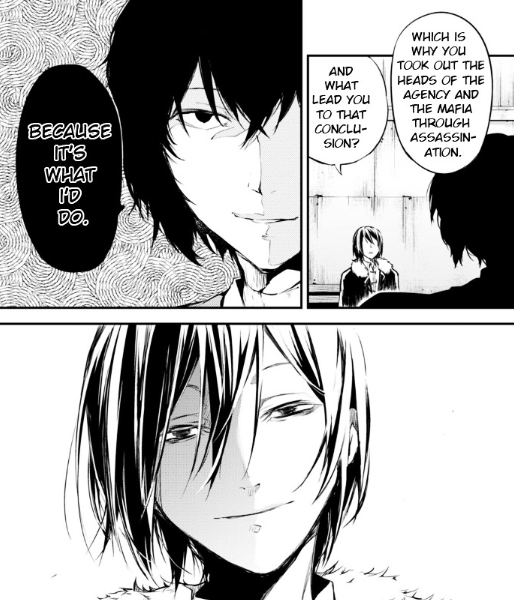
Dazai explains he was able to predict where Fyodor would end up, because if he were in the same situation it was what he would do. When he says that, Fyodor shows Dazai the same smile he showed him earlier, like Dazai is looking in a mirror.
Dazai and Dotsoevsky are able to read each other so well, knowing the other like they know themselves. Which allows both of them to continually one up the other and predict the other’s movements. However their relationship extends far beyond ‘Being the same’, or just the fact that they’re both highly skilled manipulators who are able to pull off complex plans. It’s even much more than Dazai and Fyodor are just smarter than everybody else in a way that isolates them. They are each other’s inverse in almost every way while appearing to be exactly the same. I’ll elaborate in detail beneath the cut.
1. No Longer Human
First off, while Fyodor’s character, such as being referred to as a demon and his ideology for crime and punishment draws from Dostoevsky’s novels, the relationship between Dazai and Fyodor is a direct literary reference to No Longer Human.
The character Yozo (who Dazai is in part based off of due to his tendency towards buffoonery to use as a mask for his feelings, and his ability is directly named after the book) in the fourth Memorandum of No Longer Human discusses the antonym of crime with his ‘friend’ Horiki. Already from the way the narrator describes his friendship with Horiki you can see parallels in how Fyodor views his connection to Dazai.

The conversation starts when Horiki refers to Yozo as a criminal. Don’t be so cheeky, I for one have never been tied up like a common criminal the way you have.” After that the conversation turns into an antonym game between the two of them. Yozo turns it into a game to distract from the serious accusation that he is actually a criminal and he got away with not only committing double suicide with a lady who amounts to a stranger to him, but he’s lived his life so far stealing money from the other women he’s been in relationship in. The “joke” of the conversation is that while it sounds deep, the two of them are just playing a game.
Any of these two words could be set up as antonyms as long as you give enough justification. It’s a joke of binary opposition and dualism. In short, you can give justification that things are opposites, or you can give justification that things are actually the same, there is no universal truth there is only differing justifications.

[...]
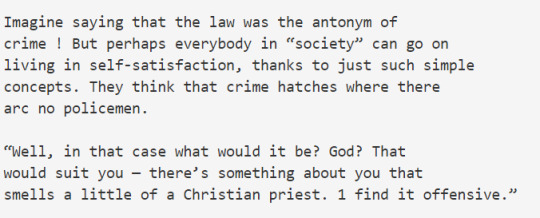
[...]
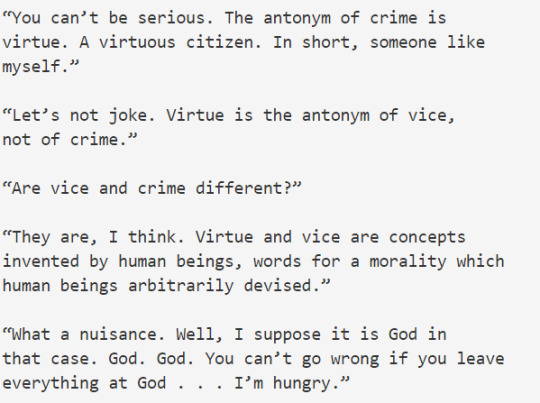
[...]
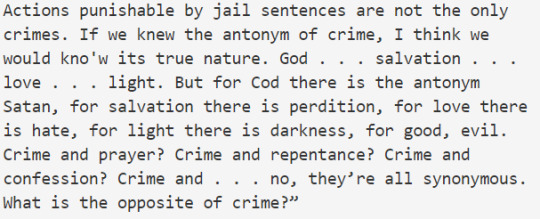
[...]

At the end of the conversation Yozo relents to this point, he tries to think of antonyms of crime but they are all synonyms. Crime, and god, Crime and repetance, Crime and confession, Crime and punishment he finally questions whether the last is synonym or antonym but before he can finish the thought he’s interrupted. Just before then though, he believes himself having come to an understanding of the chaos of Dostoesvski’s mind.
Hence the relationship between Dazai and Fyodor. We are meant to question, are they synonyms, persons with similar meaning, or are they antonyms absolutely incompatible ideas as irreconcilable as oil and water. Note that in the original novel Yozo does not really come to a conclusion on this thought, and in all of my thinking this over I don’t think we are meant to see them as all the way one way or the other just yet.
Either way this conversation has already been referenced several times in Bungo Stray Dogs. “God, is the antonym of crime”. Then you have Dostoevsky who positions himself as the opposite of crime, and therefore sees it is his responsibility to become God.
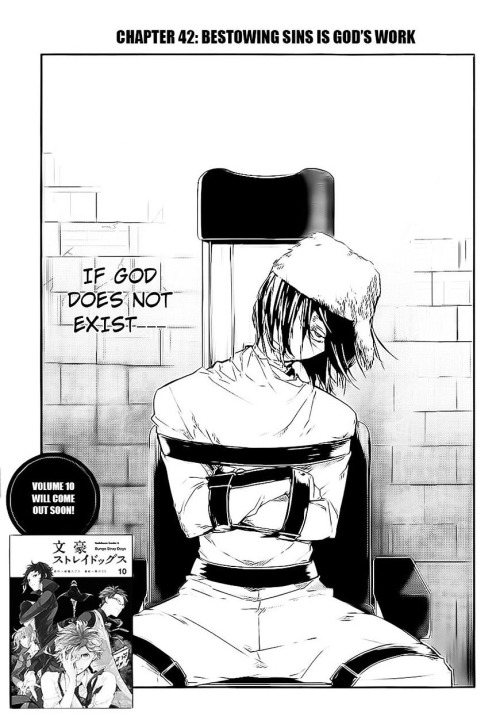
However, the antonym of God is posited by Yozo not to be crime, but rather satan. Therefore we have Dostoevsky not only taking on the role of God, but also of a demon. Despite being referred to as “Demon Fyodor” several times, Dotsoevsky actually positions himself as both at once, he is both God and his Antonym the devil, and therefore they are synonymous because they are both him.
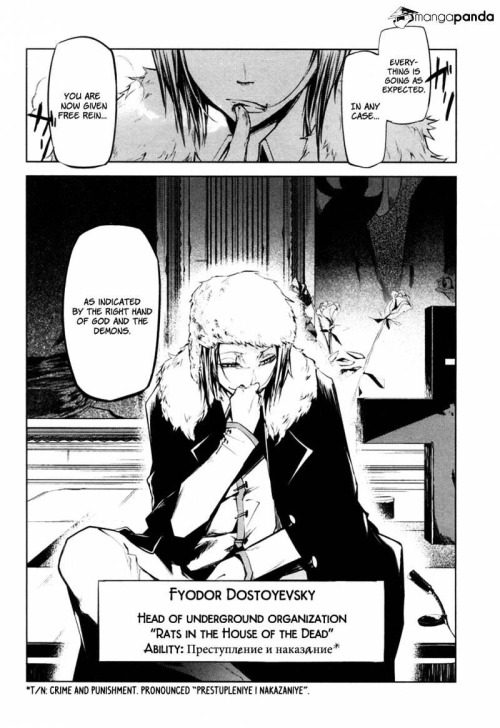
Horiki at one point in the conversation even references, that while talking philosophically about crime Yozo is also a criminal. What does Fyodor do, but get Dazai arrested and separated from the rest of the Detective Agency for the crimes he committed in the past, because despite which side Dazai is on in the eyes of the law he is just as much a criminal as Dostoevsky is. Even if they are on opposite sides of a conflict (antonyms) they will still be seen as the same in the eyes of society (synonyms).
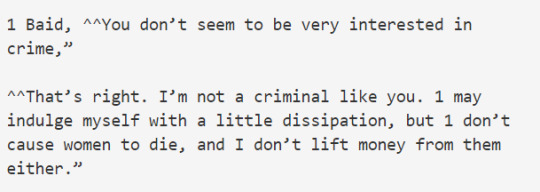
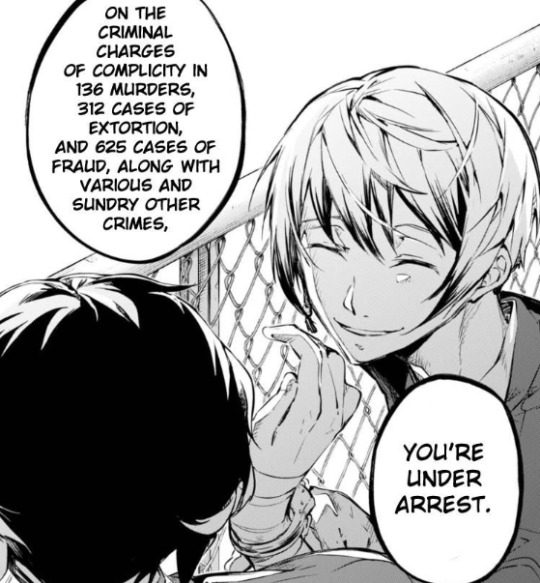
Then there’s of course the scene from the movie Bungo Stray Dogs: Dead Apple which directly references not only this conversation with Horiki, but at the same time the novel Crime and Punishment.

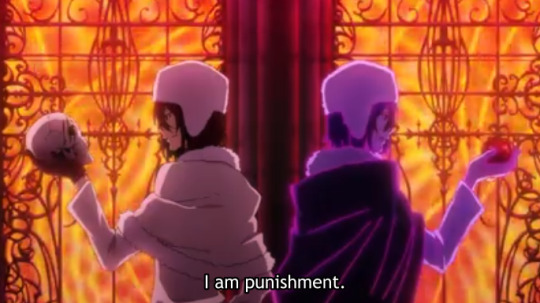

Therefore in the original text Yozo may see them as antonyms, but Fyodor makes the argument they are synonyms. While he does so, both him and his shadow (his ability removed from him by the fog) are standing in juxtaposition of each other holding contrasting objects. A skull, and an apple. Apples can literally symbolize so many things, but here it’s just a symbol of binary opposites life and death. Or rather what is perceived as binary opposites. Life and death perceived as antonyms can also be seen as synonyms as Dazai explained to Chuuya.






Death can be viewed as something opposite and entirely alien to life. That is life cannot possibly exist within death, because death by its nature kills life, or death can be viewed as a natural part of life. Therefore it is impossible to understand the value of life without contemplating it’s perceived opposite death.
Poison and medicine can be seen as opposites, one kills and one saves, but if you overdose on medicine its easy to poison yourself with it. The more closely you examine them, the lines between supposed opposites begin to blur.
Then you have Dostoevsky, crime and punishment are seen as opposites. Crime is unjust, and harms. Punishment is justice, the opposite of crime, it’s foil and prevention. Except, Justice can harm too, it just harms criminals. Except criminals can just be innocent people falsely accused. It’s never as black and white as it seems to be. Therefore, Dotsoevsky’s belief that they are not enemies but rather friends, it’s impossible to punish crime without thinking like a criminal. To punish crime, Dotsoevsky becomes a criminal.
The apple, and the skull while seeming like opposite symbols can actually be the same thing, hence the title of the movie Dead Apple.
2. Dead Apple
As the movie is canon material I also think it serves as a great introduction to the psychology of Dostoesvky’s character especially in comparison to Dazai. There are two subtextual psychological components to the movie, drawing from both Freud and Jung.
In a brief summary of the movie itself, ability users are separated from their abilities due to a fog which causes their abilities to take form and attack them. This is really obvious Jungian shadow symbolism. Their abilities which always exist as a part of themselves and therefore a subconscious part of them are brought to the surface and they are forced to confront them.
In Jungian psychology, the "shadow", "Id", or "shadow aspect/archetype" may refer to (1) an unconscious aspect of the personality which the conscious ego does not identify in itself, or (2) the entirety of the unconscious, i.e., everything of which a person is not fully conscious. In short, the shadow is the unknown side.
Because one tends to reject or remain ignorant of the least desirable aspects of one's personality, the shadow is largely negative. There are, however, positive aspects that may also remain hidden in one's shadow (especially in people with low self-esteem, anxieties, and false beliefs).
For example among the three main characters of the movie each of them are confronted with a shadow version of themselves, Rashomon for Akutagawa, Demon Snow for Kyoka and Beat under the Moonlight / The Tiger for Atsushi. There are several Jungian symbols associated with this process already, for one it’s specifically a fog that allows these shadows to manifest. The fog of the mind is what allows us not to be aware of the subconscious. When abilities are stolen they manifest with crystals that appear on the forehead, which also happens to be where the brain is. Neither of the three main characters are able to win their ability back until they accept something repressed about themselves.

(Pictured literally a tiger in shadow, two Jungian symbols the beastial instincts that represent the unconscious mind, and also the shadow which obfuscates).
Kyouka that she does not want to hate Demon Snow even though the ability is responsible for killing her parents and also making her a murderer. Atsushi is the slowest of all to regain his ability back, due to the fact that he subconsciously rejects being an ability user. We see his flashback in the movie, first he blames the Tiger for his miserable life, he sees the tiger as the opposite of himself beast rather than man, an out of control monster. Then, when he realizes the tiger also protected him during life, despite being violent, Atsushi comes to the realization that his relationship is more complex than light and shadow, complete opposites.
People tend to deny their shadows, but the shadow is not necessarily the true self or more right than conscious mind, at the same time its still a part of yourself that needs to be acknowledged. Atsushi’s ability is even named “Beast under the Moonlight”, the moon is a classic symbol associated with Jung, because it represents the unconscious mind, the time of dreams, illusion, and when shadows are the longest.

In the climax of the movie they literally ascend a tower, directly underneath the moonlight.
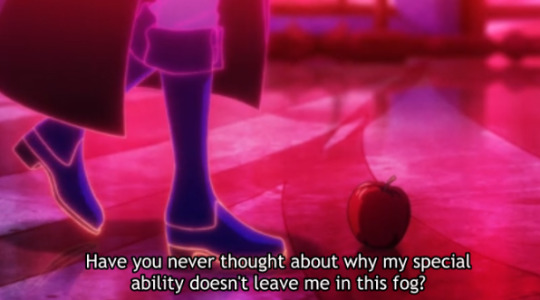
Then there is Fyodor whose ability never separates from him and attacks him during the fog, and why is this? It’s because Fyodor already knowingly, willfully embraces his own shadow. He has no reason to deny what everybody else represses, because crime and punishment are friends.
In other words Fyodor already is his own shadow. He’s a walking Id.
The id, ego, and super-ego are three distinct, yet interacting agents in the psychic apparatus defined in Sigmund Freud's structural model of the psyche.
The three parts are the theoretical constructs of how the activity and interaction in our mental life is described. According to this Freudian model of the psyche, the id is the set of uncoordinated instinctual trends; the super-ego plays the critical and moralizing role; and the ego is the organized, realistic part that mediates between the desires of the id and the super-ego.
Why are both the protagonists and antagonists assembled in trios in dead apple? It’s because both of them are representative of the trio of the psyche. Fyodor, Dazai and Tatsuhiko are deliberately grouped as a trio, because they are Id, ego, and superego.

Id, or I desire is uncoordinated instincts similar to the shadow. Reading the movie through this lens, it paints an interesting psychological portrait of Dotsoevsky. Of the trio he’s the most straightforward with his desires, he’s the one who seems to be ‘evil’ only for the sake of indulging in it and enjoying it.

He plays the part of laughing villain the entire movie, and yet he also makes it clear this is an act to him. Therefore, when he claims that this is all for a laugh that’s not a statement that can be taken as a direct truth.

As the symbolic Id of the movie, as the one who embraces his shadow he also plays the role of bringing the repressed truth that Tatsuhiko hides. He’s the one who encourages Tatsuhiko to rampage at the end of the movie.
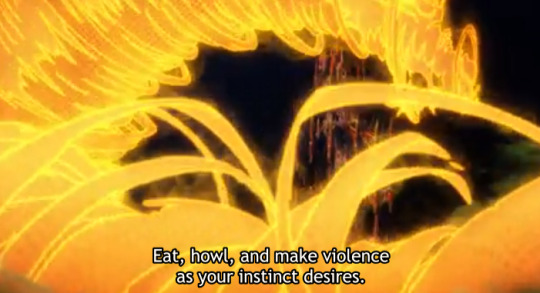
As he gives this speech Fyodor and his shadow overlap, because Fyodor is his own shadow, a walking shadow, he deliberately indulges in the worst of himself. That is why he sees himself as a demon, that is why he acts out on his god complex. That is the methodology which he chooses to bring forth his ideals, a world without Ability Users.


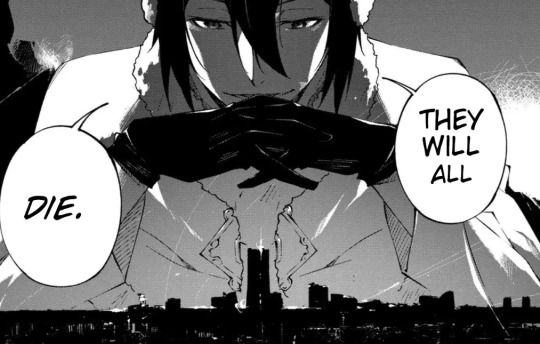
Therefore his actions in the movie make perfect sense with his established motive in the manga, to commit a purge on ability users. Dazai even asks if Tatsuhiko will be saved by an angel or a demon before Dostoevsky introduces himself as a demon.

It’s more binary opposite symbolism and the intention is clear. Dotsoevsky views himself as soemone who becomes a demon to save others, in line with his actions in his major introduction chapter in the manga.
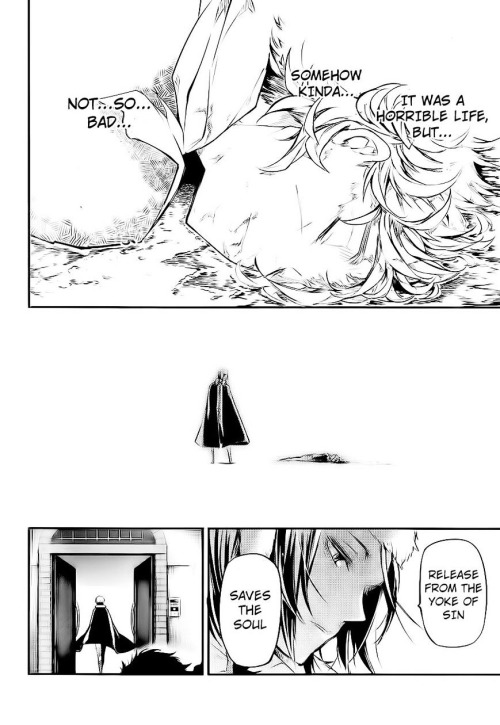
Demons are also in the bible, the creatures in charge of punishing sinners. Despite the fact that they are seen as rife with sin themselves. Another contradiction, for Fyodor a demon is something he has to become in order to punish crime, therefore he walks side by side with his shadow, therefore he indulges his id.
Then, you have the other two serving as the opposing roles of the mind. Tatsuhiko is superego. Not only is he capable of controlling others to such an extent that he can make their abilities manifest against their will, but the extreme control he has makes him an utterly joyless existence.
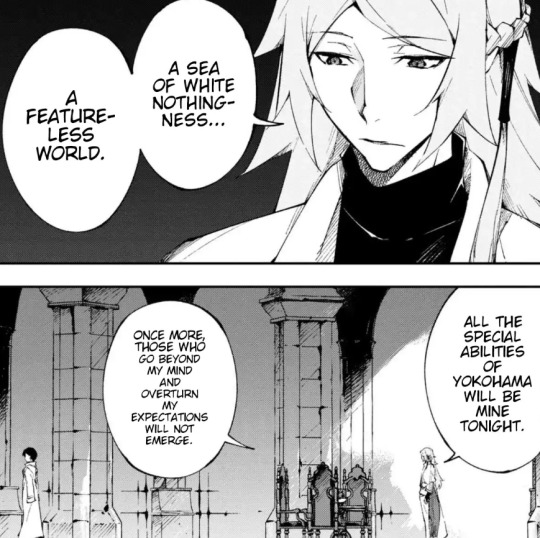
The balance between the two, the ego Dazai is the only one of the three of them who seems to have found any reason to live at all. His reason being the opposite of Fyodor. [Death] and release of the yoke of sin saves the soul. In comparison to Oda’s words. People live to save themselves huh, how true...
Dazai is the only one out of the three who has any semblance of control or purpose to his own life, and it comes from following Odasaku’s words.
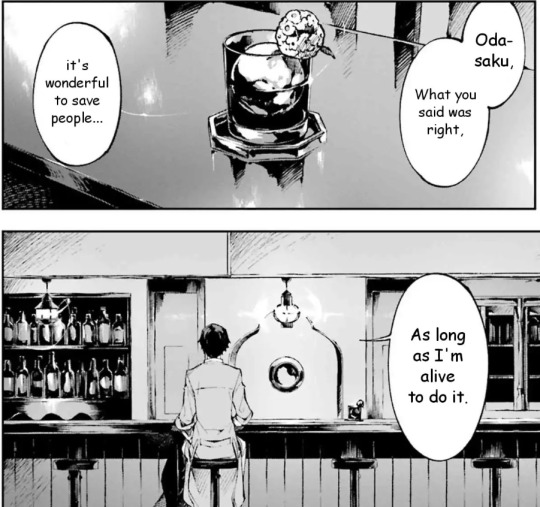
Ango’s summary of the three of them at the end of the movie shows that he does not quite understand Dazai, which makes sense as to why they never quite became friends. Demon Fyodor, Dazai “Disqualified from Humanity” and Tatsuhiko (turns into some kind of weird dragon) all three of them may seem inhuman but the moment you refer to them as aliens you fall for their illusion. All three characters are still undeniably and painfully human. They want to be seen as aliens to avoid being confronted by this, that’s the game all three play.
Here’s the thing, Dazai is the only member of the trio who is not alone and part of that is because he had a friend who just saw him as he was, a flawed human being.

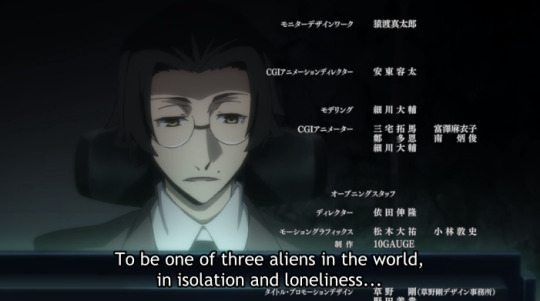
3. The Demon Fyodor
For this final part I could list all the similarities and differences between Dazai and Fyodor, but that would just be a boring list so instead let’s analyze Fyodor who is currently the more mysterious character as to his motivations, using Dazai as a reference point.
Before anything else, I’m going to use Oda’s words on Dazai as a reference point, because Oda had the best read on him.
"Listen. You told me that you might find a reason to live if you lived in a world of violence and bloodshed. You won't find it. You must know that already. Whether you're on the side who kills people or the side who saves people, nothing beyond what you would expect will appear. Nothing in this world can fill that lonely hole you have. You will wander the darkness for eternity. (...) Be on the side that saves people. If both sides are the same, become a good man. Save the weak, and protect the orphans. Neither good nor evil means much to you, I know... but that'd make you at least a little bit better. (...) Of course I know. I know better than anyone. Because... I am your friend."
So, let’s define Dazai as a character who good nor evil means very little to, and is on the side of saving others simply by choice. He’s not motivated by lofty ideals. He’s not even a particularly moral person, willing to indulge in the unsavory sides of himself if it gets the results of ‘saving others’.
He’s someone who can commit crimes with little foibles. Though I would not say he does not feel any guilt at all because there’s a clear difference between his mental health when he was in the mafia killing people, and when he was on the side of the Armed Detective Agency. He also has the ability to feel attachment to others, because he was clearly sad over Oda’s death. He’s not empty of all emotion, but at the same time a lot of Dazai’s life is spent in contemplation of his own emptiness.
While Dazai moves pieces on a chess board and can see the bigger picture, I would argue that his motivations are much more personal and selfish than Fyodor, even though Fyodor is a cackling demon of a villain. Dazai is motivated by human beings and their individual stories, he leaves the Mafia not because of the hundreds of people he killed but because his one friend died. He is pushed to becoming a better mentor, because both Atsushi and Akutagawa need him to be. I’m not saying selfishness is bad, or selflessness is good the entire point of this essay is to deconstruct that simple black and white thinking.
Let’s say simply put, Dazai is a selfish character, lacking in ideals but still motivated to save others. He contemplates life and death similiar to Fyodor, and the same way that Fyodor finds punishment for criminals in crime, Dazai tries to find a reason to live in pursuing death.
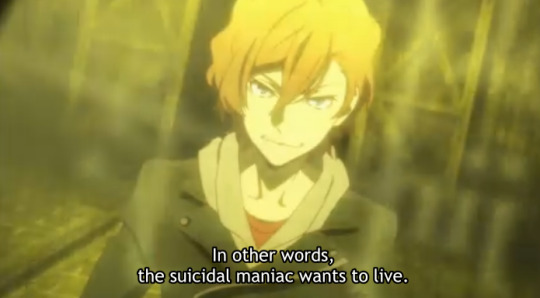
Even that, is a personal motivation.
So then in comparison, Fyodor is impersonal and acts against his self interest. If Dazai is on a path of salvation, living to save himself, then Fyodor’s path is marked for self destruction.
Starting with his formal introduction in chapter 42, Fyodor is introduced as a soulless man, lacking sympathy for anybody else. However, I would argue the opposite the chapter clearly shows Fyodor sympathizing with the child he spends most of the chapter talking to.
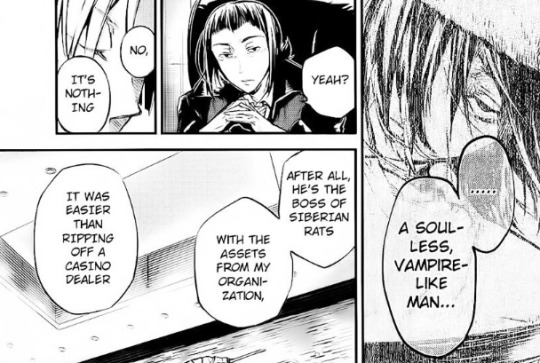
Remember the entire chapter Fyodor is playing Ace for a loop, he’s only letting Ace see him as he wants to be seen. Therefore everything he’s described as to others “Something more awful, and heinous than a villain” is the act he puts on.

In the chapter we see a child honestly encourage and try to connect with Fyodor, only for his attempts to fall on deaf ears by the end of the chapter when Fyodor chooses to kill him as a witness. Fyodor gives the impression that he was not listening to the boy the entire time.

Yet, if Fyodor was ignoring him, if Fyodor did not feel a thing about the boy and was not sympathizing him in the least then why did he take the time to explain things and talk to him before sending him off at the end of the chapter? If Fyodor is able to kill him so easily so as to not see him as human, why does the boy feel like he is understood?
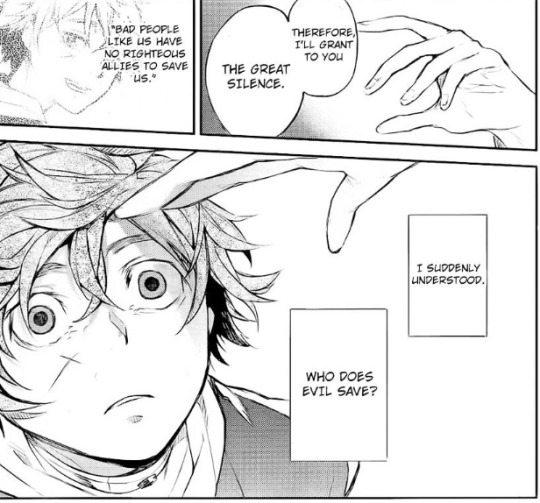
Rather than just ignoring him and treating him like a piece on the board, I argue that Fyodor did see the boy as a person. The panel shown afterwards does not display the emotion of a remorseless slaughter. The entire panel is shown as empty. Fyodor regrets this action, killing the boy in such a way.

At the same time he feels like he must do something he personally does not want to do. In order to punish evil he must become something even worse than evil.

Therefore you have Dazai, living to save himself, attempting to be a better person than himself when he’s really just kind of a self obsessed person, and you have Fyodor, who lives to save not himself but the whole world and therefore he must damn himself to demonhood and become the worst version of himself.
Dazai searches for life in death, hence why he constantly attempts suicide. In its own weird way, his suicide attempts, his getting involved with death, murder, it’s all him looking for a way to live.
Whereas Fyodor genuinely believes with all of his heart, that death is something that cures the sickness of life. Not only do we see him have the opportunity to save someone only to kill them as a witness, denying himself the possibility of redemption. We also see him manipulate a child into suicide in front of Kunikida.

Because as he currently believes it, the world as it is will never bring salvation to those children. His act of manipulation is just a symptom of what is currently wrong with the world. After all, Dostoevsky pretty easily got this man to agree to arm his little brothers and sisters to the teeth and put them into danger. A child who exists in this world as it is cannot be saved.
Every character who ideologically alligns with Fyodor is looking for freedom from the world, in some form. Fyodor’s style of manipulation itself is a paradox, he controls their every action even resorting to blatant mind control in some places, and therefore he frees them from the burden of making their own decisions.
Then, if Fyodor is actually an idealist who genuinely does want a better world, and not just a laughing demon then why does he specifically target Kunakida the idealist of the detective agency? It’s because he’s an idealist, that Fyodor wants to crush him. In other words he wants to break weak and faulty ideals that cannot save the world.

Yet, it’s also an act of self loathing. It’s not that Fyodor is necessarily evil, but rather someone who becomes evil for the sake of his ideals. The reason for that is ideals are so high and mighty he needs to become god to enforce them, he desires a world much better than this one therefore he carries the weight of the world of his shoulders. As a person, just like Kunikida, Fyodor is constantly being crushed under the weight of his own ideals. That is why he seeks to crush Kunikida, to prove that Kunikida is weak, and therefore he is strong.


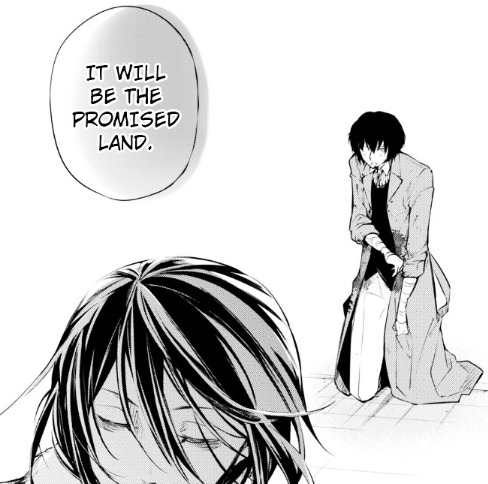
If what he seeks is paradise, then it makes complete sense that he would see it necessary to become god in order to achieve that. However in the end, Fyodor is not a demon, nor god, nor alien, he’s infallibly human. He’s so completely obsessed with the bigger picture, with providing salvation to all, that he will never be allowed to moved by personal motivations.
He sympathizes with the child who is wearing Ace’s collar, but cannot allow him to live even if he wants to.
It’s not that he will never allow himself to be moved, it’s not in Fyodor’s own mind he cannot. If he were to cede to one personal bias then he would never be able to accomplish his goals that are so lofty that he would need to become god in order to accomplish them, therefore it’s better to become an inhuman monster rather than be tripped up by personal feelings.

Whereas Dazai is motivated towards good and saving others, almost exclusively by the fact that there are people in his life who he is personally invested in.
It shows finally even in the difference for how they use people. Both Dazai and Fyodor rely on trickery and manipulation to move people, and sometimes it can seem like they only view others as mere pieces on a board. They have a tendency to also assume they know what is best for other people and move them without their consent.

The difference being that at the end of the day Dazai still sees others as individuals. He always leaves the element of choice. While Dazai pushes Atsushi and Akutagawa together even though they hate each other, because he believes the two of them are what’s best for each other he always leaves Atsushi with the choice of how he wants to proceed.
Therefore they remain individuals, therefore they are still people in his eyes. Even if Dazai always plays with his cards close to his chest, his plans fundamentally rely on trusting others, and others trusting him. Even in Dead Apple, his plan involved knowing Chuuya would use Corruption and that Chuuya would trust in him to stop him.

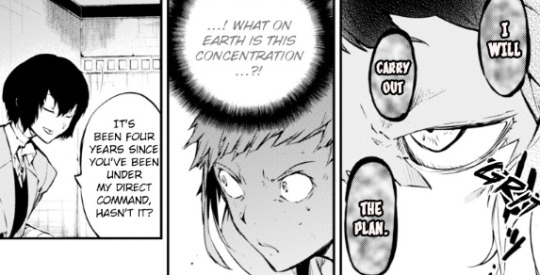
So, let’s say Dazai is someone who generally needs other people to carry out his plans. This is in contrast to Fyodor who once again, takes the burden entirely on himself.
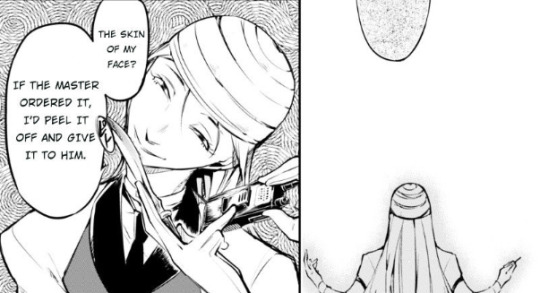
Fyodor’s allies are more akin to slaves who worship him.

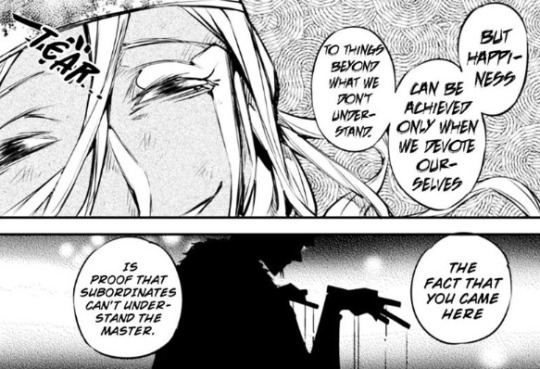
He literally messes with their brains to free them from hardship. Which goes along with again the binary opposition, his brain is modified to feel unhappiess, therefore he is happy. Because by that black and white logic, unhappiness only exists as the opposite and antagonist to happiness. The extension to Fyodor’s extreme logic, that the absence of crime will therefore bring peace to the world. All of Fyodor’s direct subordinates are liberated in this way, if he takes on all the decision making for himself, takes on all the burden for himself, then they are freed.
Goggol explains what are probably Fyodor’s own viewpoints via foiling, and being allies very well. That it is easier to imagine all of them as inhuman monsters who cannot possibly have a reason behind their actions. It’s more comforting, it’s freeing.
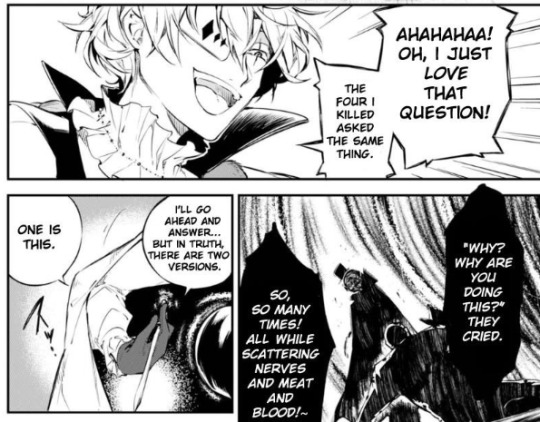

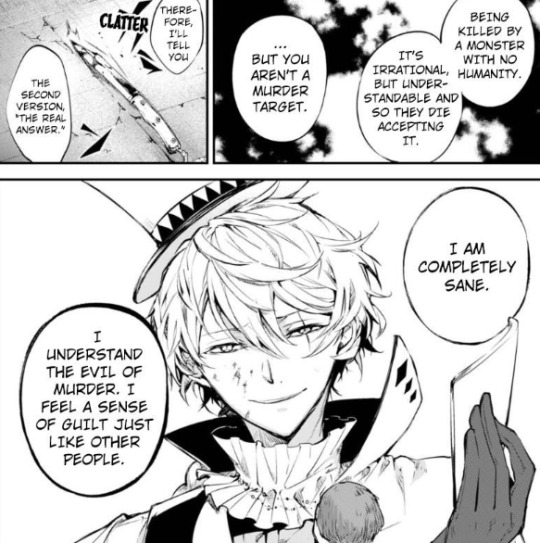
To do what he needs to do to change the world, Fyodor must become an unfeeling villain and he does the same to his subordinates, he actually modifies them and removs them of their emotions.
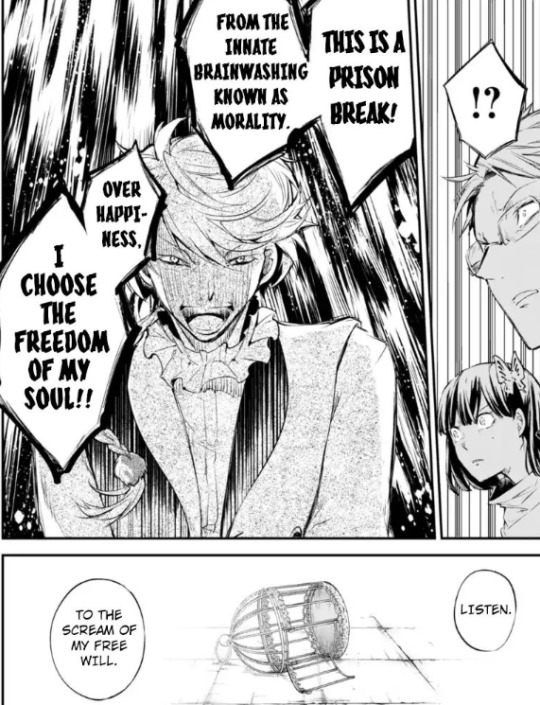
So therefore it’s a paradox, his allies and servants see themselves as completely free in their devotion to him, yet at the same time Fyodor’s manipulation is the opposite of Dazai’s. Rather than leaving it to choice and trust, he removes their ability to choose, he removes their ability to disobey him. It’s as if the only way he can think of for people to be righteous, is to remove their ability to sin in the first place.
It’s even apparent in their joke question and answer session. Dazai tells Fyodor to just inspire his subordinates to be better people the way he does with Atsushi and Aktugawa, and it seems like the idea did not even occur to Fyodor. Fyodor tells Dazai the way to win a woman is to cut off everything else to the point where she becomes completely dependent on you.

So, in conclusion it seems a lot of Fyodor’s mindset is a result of him purposefully taking on the burden of saving the entire world on himself, because he cannot allow himself to view others as equals. In order to continue justifying himself, he needs believe that he is the only person capable of doing these things and therefore he knows better than anyone else.
Dazai and Fyodor are both smart enough to be aware of not only the emptiness of life, its lack of purpose, its senseless cruelty. Their reactions however are opposite, Dazai decided to live in spite of being unable to ever find meaning whereas Fyodor decided to dictate that meaning to everyone else and decide it for them, like his words are the word of god.

Bestowing sins is the work of god. If god god does not Exist, I’ll become him.
#bsd meta#meta#bungo stray dog meta#dazai osamu#OSAMU DAZAI#fyodor dostoevsky#no longer human#bungo stray dogs analysis#bungo stray dogs character analysis#bungo stray dogs theory#literature analysis
1K notes
·
View notes
Text
And from I, to You
[Summary: It’s the day after the ball—the one where the Prince Charming picks his cinder-bride by her shoe size. Absolute insanity, yes, and Anastasia Tremaine knows of it. But she also knows a lot more other things, such as her gone-mad mother and the thoughts of oh-so-silent Drizella, her older sister. Holding the only slipper in existence, Anastasia also knows who the shoe fits exactly, but since when was she a good girl?]
It would not fit.
The glass slipper just wasn’t right.
It didn’t seem like it’d be a matter—at the time.
Now, Ana had chosen to help Mother slice Drizella’s heels off to fit.
“It’s only a little, Anastasia. Help your sister. Now.”
She was always helping. Surprised no one when she gave a curt nod, soon retreating to her room. The silent walls welcomed no one when she entered. Hadn’t this been Cinderella’s room before Mother took over? Even now, the room rejected her, as the slipper did.
The glass slipper was fortunately larger than her foot, so she hadn’t had to slice her heel to fit.
Perhaps Drizella’s heel would be the finishing touch, and she would go live with the prince after all; abandoning her mother and her duties, helping no one no more. Well perhaps she could help the prince, after all, she had a many ideas of how to be the perfect princess. Balls, curtsies, you could name whatever it was, and Ana would be there. She was the helper—the only helper around these parts. Even then, as it was, rejected her too.
The happy memories with little Drizella and sane mother seemed to coerce her back into the depths of her both internal and external cocoon. She let out a short, deprecative chuckle. Ana was out of it, that or more. Thinking about it, she reached a conclusion. If Drizella had just let her be oh-so-nice to Cinderella at least once more, she thought, maybe she would spare a thought of whisking them away from Mother once and for all.
Alas, Drizella would never allow that, with her enormous pride, and so-so, ruling out fleeing to another continent. Plus—if it was possible to reach heights of peak intoxication before dropping dead, it would not hinder Mother before she walked up and bashed both Ana’s and Drizella’s skulls with her leather slipper. The poets speak about it, but experience is never the best teacher.
And if you’d ask her how she knew the slipper would fit on Cinderella’s dainty feet, she would’ve mumbled an incorrigible set of words and slumped on her prep-table, as she did now. Occurrences fit of insanity always seemed to happen to Cinderella. Drizella had joked of it being some kind of curse following the time Cinderella’s cursed birds had bit her nose, but Ana knew it was more.
Ana considered shattering the glass slipper—watching the pieces break into completely immeasurable shards of her glass and glass, thorough. She hoped it might help her, but it wouldn’t, really. She stared at the slipper in her grip, the familiar sound of glass cracking.
Mother often got violent with Cinderella, and sometimes, Ana would pause outside Cinderella’s door, hoping she was alright and well. It was just her inner desire—to make sure that even with the chaos and their desire not to let any of it change, they would at the least be alive to relish it.
She remembered the time Cinderella caught her, her face bruised and tired. In Ana’s hands were several bandages, and she placed them down. They stared at each other for a long time before resuming to their duties, fractures of both their words hesitant to make the step. Cinderella had signalled to speak first.
Ana remembered a short conversation they had, where Cinderella relayed her fears and wants. It seemed like they weren’t from separate worlds, just two girls, having a chat despite their differences.
Cinderella had talked and talked, oh-so-long, desperate for Ana to listen. It seemed like she was concerned with her own significance in the eye of it all. Mother’s violent tendencies would definitely impact any sane person’s health, but it had completely pushed Cinderella to a conclusion where she felt like she didn’t understand why she was there, then and why. Her father was dead, her mother was dead, and her stepsisters treated her as close to horse-dung as possible. And horse-dung just... stank.
But one of her stepsisters was there, listening intently, so she had toned the abrasiveness of her words. Still, it stung. Under normal circumstances, Ana wouldn’t have condoned her actions toward Cinderella, but she had no excuse. She could speak days of what Cinderella really meant under her subtle glances and rushed words, but Cinderella had tried to be acceptable towards her. Cinderella had isolated her identity from the world under the pain, and she really did not seem to attempt speak of herself as in the ways of any normal person.
To her, she was lowly and confused, and it was integrated oh-so-deep. She had lost everything. She blamed herself for everything. For... every single of the things. Ana could see how withdrawn she was from both the world, and her true self, and it disgusted her so much she felt direly uncomfortable in her own skin. Why had she let this happen? She ached and ached to reach out to Cinderella and help her realise that she just understood, to tell her how much she cared for her wellbeing and safety, and how much she resented and realised how much her actions hurt Cinderella. But ultimately, she could not. She didn’t know why, but she knew how much it felt—and she hated it.
Anastasia hated every fibre in her being. It was not pleasant. She had the flesh, but her body would not call it hers. She despised herself, and even Mother and Drizella were not to be free from her seemingly endless refusal-to-blame.
Years of Mother’s and Drizella’s repression could not be erased by one simple girl. Ana knew that, oh-so. She tried. Cinderella got more dependent on Ana as the times went and passed, aching for the instability that Ana seemed to emanate. Ana’s complex feelings and the overwhelming betrayal she could’ve caused her sense of morality to fluctuate wildly, and along with her muddled blame, continuing to bring out the absolute worst in her.Cinderella should not have wanted that discord so strongly that she did. It was the only thing she had, but it wasn’t... right. It wasn’t just, and to that, it wasn’t right. Cinderella deserved better. She did.
Weeks of mood swings and migraines had, of course, alerted Mother and Drizella, and one evening, while strolling through the garden, Mother had noticed the two girls chatting. It had been the last straw. For some reason unknown to man, she exploded. There was to be a ball to display eligible girls for the prince, and even though Ana found it quite distasteful, she agreed to go. If she was some kind of runner-up, at least it would be bountiful news. It upset Cinderella when Mother ordered her not to go, among other things, and Ana was pleasantly surprised to see that she wasn’t the slightest bit bothered by it after.
Nevertheless, it wasn’t a competition.
Ana sighed, stepping out from her room. It seemed like everything wasn’t going right. The prince had been with a seemingly ghost throughout the ball, never pausing to entertain another noble lady. Her thin, small frame glided through the corridors, stopping at the stairs. Mother had already shattered the other shoe. Who was to say they had another replica at their disposal? She closed her eyes and pursed her lips.
Cinderella’s calloused fingers shook her out of her thoughts, her hand resting on Ana’s bare shoulders. She didn’t say a word. Cinderella didn’t have to. Ana... knew. Her eyes had inevitably found hers at the ball. Poets would argue it was because of their common insanities. Ana didn’t know of any poets. Still, Ana forced herself to turn away from the inevitable. Now, it faced her on all sides.
Ana handed her the slipper, but Cinderella’s hands didn’t leave her shoulder. Her mind drifted. Sometimes, she didn’t think. Her mind was blank, and her eyes only focused on the girl before her.
“And from I, to you,” Ana smiled, her words hazy. “Be alright, cinder-girl.”
“Am I fine in thinking you would not want to come with me?” Cinderella inquired. There was no malice, no silently laced words. There was only Cinderella.
And she knew that by leaving everything Ana ever wanted—someone to truly love her as her, and not by obligation—there was no second “Oh, have you been faring well?” This was the end.
“Yes. I’ve realised some things,” she sighed, a sad smile on her face. “Half of those, I have no idea what are. But I understand the thoughts behind those things. Mother—Drizella—I can’t leave them.”
“I know. Will you stay?” The word hanged in the air, but Cinderella refused to say them. Ana smiled, the edges of her eyes crinkling.
“Forever...? I need to, Cinder. I’m not so sure it’s a question. They’ll run themselves mad. Mother probably would, at least.”
They shared a chuckle. Setting the slipper down, Cinderella hugged Ana, squeezing her tight. She attempted one, but the air felt too heavy for any goodbyes. Instead, she waved awkwardly and set downstairs for her prince.
She deserved him, after all. Ana wasn’t so sure if he did, though. She laughed at the thought. Clutching the banister, Cinderella turned one last time.
“Thank you.”
Turning to their duties, they both returned to their worlds. As different or similar they might’ve been, none mattered now. It was the end, and that was true and true.
• i wanted to integrate some character personality stuff i learned of recently,, but... i was too lazy to do anything since i wanted to focus on the characters, and not the setting, so i... did something.
• it is rushed, yes, and in the—as some published writers like to call it 😔—the horrible rough draft phase. there is no plot, as many as my works are going to be. i do not confine myself to pains of plot elements till the third date draft :D
• i really really love character psych!! that’s it!! (disclaimer: if the writing does not meet up to your standards i’m an amateur writer, so you can go ahead and tell me “oh iu, this stuff is really good omfg!! you should publish it!!!”) ;D
• not all of this is actually right. since i barely focused on some other aspects i choose to focus on one part of my characters, and not everything, so there will obviously be some lack. i also loooove minimalistic writing and will shorten sentences like crazy and have many people weirded out because of it but i just like to play around (there’s not a lot of it since my auto correct kept being trash) also it’s not spell checked
• don’t own any of these characters, they belong to disney. i just wrote the wrote! ty for reading
#cinderella#cinderella fairytale#anastasia tremaine#anastasia#drizella#drizella tremaine#ana#first post#writing#short fiction#short story#short stories#character personalities#character personality#writing test#disney#fairy tale fan fic#fairy tale fan fiction#fairytale fan fic#fairytale fan fiction#fairy tale story#fairy tale au#fairytale au#fan fic#fan fiction#au#alternate universe#disney movie#disney au#stepsisters
3 notes
·
View notes
Text
Little angsty Roman short cause the last episode is still occupying my mind (it’s called hyperfixation go blame my messed up brain)
TW: mention of suicide, suicidal thoughts, suicide attempt (?) low self estem; just lots and lots of triggering thoughts so please be cautious!!
Roman stared at his feet dangling higher than he had ever been. Between his toes, between his legs he could see the ground almost a half a mile beneath him. It was endearing. Capturing. How small a world can seem when you just put some distance between it and you. So very small. Roman wished he could do the same with his problems. But he couldn’t. They were stuck in his mind and he was stuck with his mind. There was no distance. There was no escape. Even if he tried. And he had tried.
Tried so so often.
No method ever worked.
He was stuck.
With a sad sigh he ripped his gaze away from the ground that seemed endlessly far away and directed it to the sky above him. White clouds traveling across a sea of blue. It was calming. Freeing. Roman smiled a little at the sight. He remembered all the times he had made Thomas gaze at the clouds when he was still so young, how together they had discovered a thousand shapes and figures in something as mundane as clouds. Back then it had seemed magical. The sky had seemed unreachable, unreal. Now it was just boring for most people. Roman learned to hold back with his fascination of it. He knew Thomas would come of weird if he went forward with it. So Roman stared at the cloud in the imagination instead. It was his realm. His kingdom. The sky was part of it. But even for him, now the sky sometimes seemed like nothing more than that: a blue sky with white clouds. No figures, no shapes. Just boring old sky.
Eventually everyone outgrows their old fascinations.
Thomas had outgrown sky gazing.
Right now Thomas was on his best way to outgrow Roman.
Roman knew that. He knew that he didn’t have long anymore. He was after all sitting on top of a tower, a tower nearly half a mile high, with no shoes and only very unsteady seating. There was a reason he had finally decided to come all the way up here. He had wanted to see this. Just once before he is completely outgrown. Because once you are outgrown you leave. That is the rule. And if there was one thing Roman had to do now, it was follow rules. If he didn’t he truly would be as bad as his brother and even in his last moments he couldn’t stand that thought. He had to go. The others had all made that painfully clear. The villain has to leave so the hero can live his life properly again. Roman didn’t want to give Thomas even more of a hard time. He had done enough. He was done.
The sky above him looked beautiful in all its glory. Blue and white. Beneath him the green hills and mountains were tiny, the trees only small spots in an endless field. It was truly beautiful. Roman didn’t mind disappearing here. He wondered how it would feel to fall, to just let go and be surrounded by nothing but air. To fall. For one last time. Would he finally feel happy again? Feel whole?
He wondered.
His phone rang beside him. He let it.
It was a nice little soundtrack to his thoughts.
His phone kept ringing.
It was almost enough to pull his thoughts away from him. Almost enough to make them fly away into the sky. Roman almost wanted it to be enough.
The ringing stopped.
Roman barely noticed. He was so focused on his feet that dangled too high and his breath that was too shallow for it to be normal. He wasn’t sure if there was a heartbeat in his chest. He wasn’t sure anymore. Do villains have hearts? Do they have something to remind them they are alive?
Roman wasn’t sure what he was. Neither dead nor alive. Not exactly the past but surely not the future. Not good enough but always too much. Funny how you can already be half of a pair but still feel there is another pair trapped inside of you. For a second he contemplated splitting right then and there. Splitting creativity once again. But he knew that would hurt. He knew how much. He knew it would just make matters worse.
Falling was much easier.
And Romans was standing at the edge now, arms wide as if he could fly, eyes closed and hair disheveled by the wind. He only needed to take one step. One step until it would finally all be over. Forever. Half a mile was a long fall.
He almost giggled when the wind increased pushing against his front. It was almost as if it was trying to push him back from the edge. Roman did chuckle. The wind was still hoping. How naive. The imagination sometimes truly was just that: naive.
And Roman was standing at the edge half a mile over the ground when his phone rang once again, the phone that the other sides had gotten him for moments exactly like this one. When he was lost in the imagination once again. When he was a being a disappointment. Lately the phone had been ringing a lot.
With a delighted sigh the prince stepped back from the edge that was his salvation, his escape and sat down again. His feet weren’t dangling in the air anymore. Roman already missed feeling the emptiness beneath him. It was strangely calming; the knowledge that just one step could finally make you fly. Finally make you live. Even if just for a couple seconds. Until the ground hits. It was truly strange.
One of his steady hands picked up the ringing phone laying close to the edge. Roman wondered:
had he taken that step, had he fallen, would the phone have rung for eternity?
Would it have stayed here, isolated on a gigantic tower for all eternity?
He wondered.
Then he finally picked up.
„Roman! Thank god!“ it was Virgil. Roman couldn’t help but be relieved that it wasn’t Patton or Janus. He couldn’t deal with either of them after today. Not after they had hit the final strike. Not after he was finally up here. Done.
Then his relief was instantly shattered as he heard Virgil again, this time slightly more quiet as if he was turned away from the phone
„Patton he picked up!“ then a bit louder again: „Damn you, princey! You worried us to death. I nearly had an anxiety attack....“
The guilt hit harder than Roman had expected. He had worried the others again. He truly was nothing but a mere disappointment. He was only making Thomas life harder. As always. He definitely should have just allowed himself to fly. Just for a couple seconds. Just until the ground hits.
He whispered: „I’m sor...“ but he was interrupted before he could finish. Once again, He wasn’t worthy of being listened to.
This time it was Pattons voice that greeted him on the other end of the line.
„Roman! Oh dear finally! We were worried sick! Where are you?“
The guilt was so high in his throat, Roman wasn’t sure he could answer. The edge really seemed inviting now. He scooted forward on the roof; his feet now dangling in the air freely again. The wind around him stopped the tremble of his hands. Perhaps he could swallow his guilt after all.
He never had a chance to try.
On the other end there was shifting and Roman could faintly hear discussion but no words were clear. He wondered what the others were doing, what this time was more important. More important than him. He could think of at least a thousand things.
For a split of a second it was silent again. It was just Roman staring down the fall that could kill him. That would. Eventually.
Then virgil: „princ...“
Interrupted by Remus who Roman could faintly hear screaming before he heard a loud thud.
Roman had to squeeze his eyes shut. The vouce of his brother had always been one that hurt him deep in his heart. There was something surreal about knowing that once that voice had been his too. Once they had been one. Now they were hero and villain. Roman wasn’t sure who was which at this point.
Subconsciously he leaned forward just a little bit; just that tiny bit closer to the actual end.
He regreted it immediately after.
Remus voice startled him so much that for a second he lost balance. He almost fell. He wasn’t sure if he would have regretted it.
„Sweet brother helloo!!! The three idiots you call your friends are worried. It’s time for the hero to come safe the day.“
„Then go call the hero“ was all Roman could think but he never said it. He couldn’t. He was already enough of a burden. Even for his brother.
Instead:
„Sure...“
It was patton on the phone again a second after.
„Kiddo! You are coming back then? Good! We were so worried.“
It sounded genuine.
But
All Roman could feel was that overwhelming guilt again. He had worried them. He was being a burden again. He always was.
„Roman?“
More worry. Fuck, he really needed to stop being such a bother. In one swift motion Roman stood up, his back turned to the abyss that he hoped would swallow him soon. The sky above him was still blinding, still beautiful. He didn’t feel worthy of being in its presence.
„I’ll be there in a sec.“
On the other end he heard the others chatter about; he was pretty sure he even heard deceit and Remus, both sounding more happy than he had been in a long time. He wasn’t even there but he already knew he didn’t fit in. Not there. He didn’t deserve it.
He didn’t wait for an answer from them, it didn’t sound like one was coming anyway so instead he ended the call. For a second he stared at the black screen. It was reflecting his face. The face of a fallen hero.
Or
A broken villain.
Roman wasn’t sure which was worse.
He stared back at the bright blue sky above him. The sky that made him dream. He was the side responsible most for the dreams thomas had. He controlled what Thomas desired.
In that moment there was nothing Roman wanted more but to fall backwards and never stop falling. To hit the ground. To stop.
The sky seemed perfect to be lost in. To fall away from. The perfect last picture. If only he had the courage. If only he wasn’t such a failure. Even now. Even still.
With a sigh, he started his descent down the tower secretly hoping, praying, that he would slip and fall
After all.
Disapproving.
Disappointing.
Disappearing.
He wondered,
Was that all he was good for?
#this turned out way longer than expected#also not exactly good#but you know#at least now my hyperfixation might rest for a bit#i apologize profundly for the angst#and the ton of suicidal shit#tw suidice#roman angst#heavy roman angst#roman sanders fic#roman sanders angst#angst#suicide#low self worth#ts roman#ts#thomas sanders#sander sides
15 notes
·
View notes